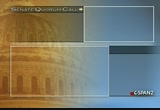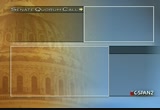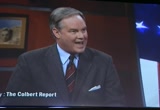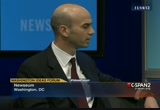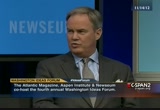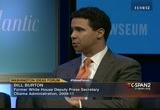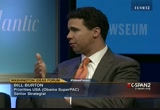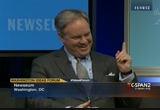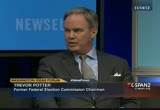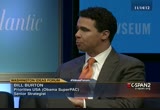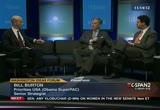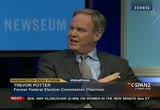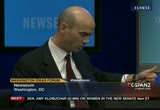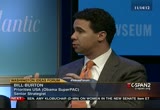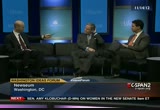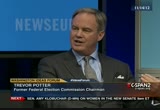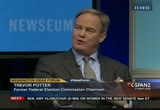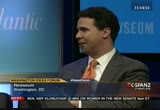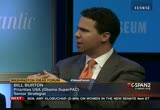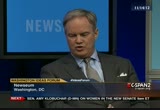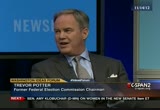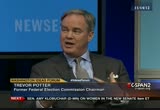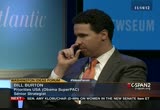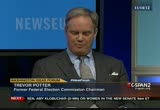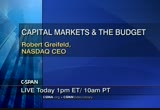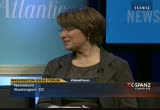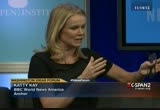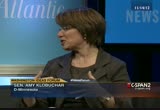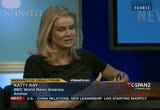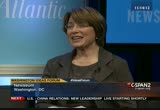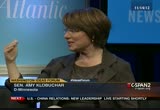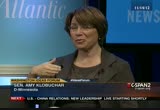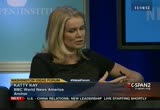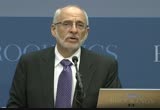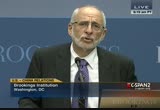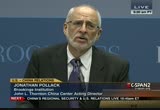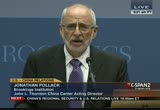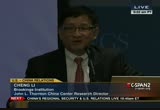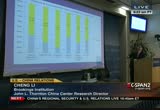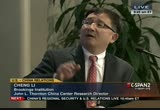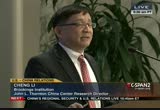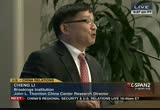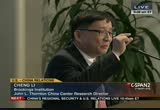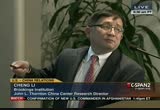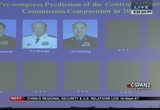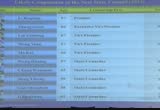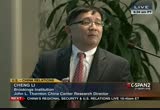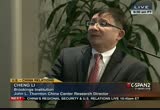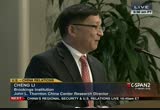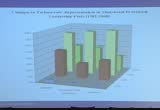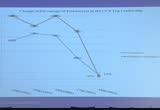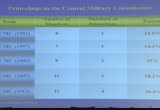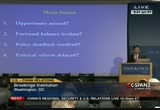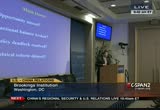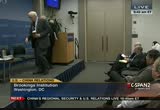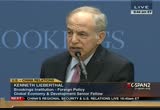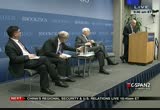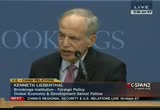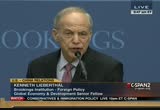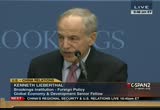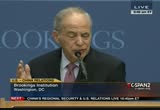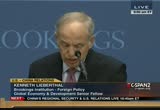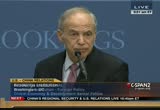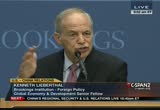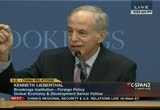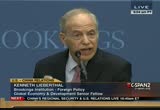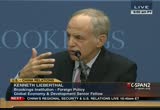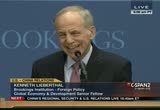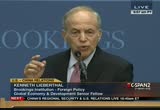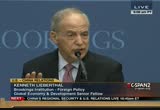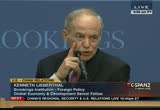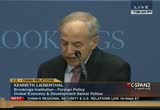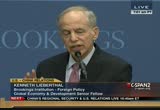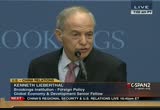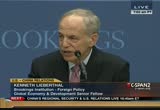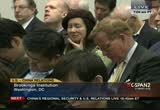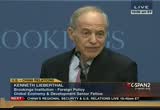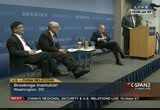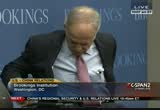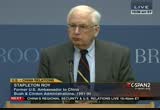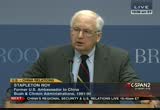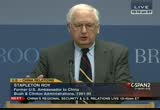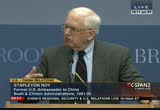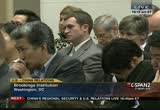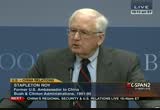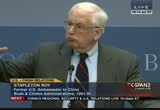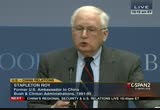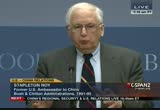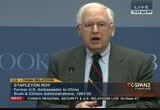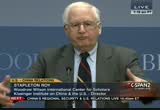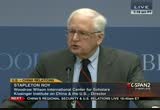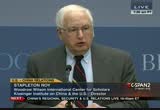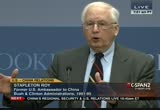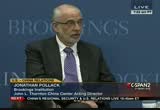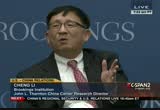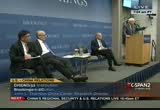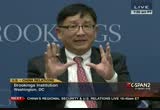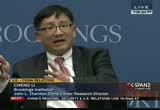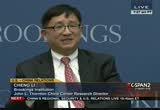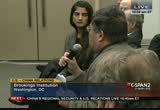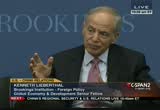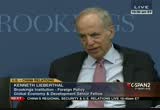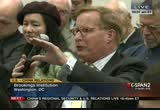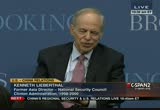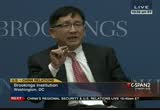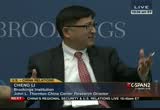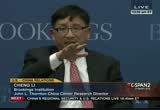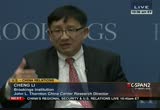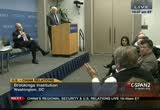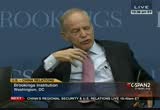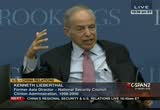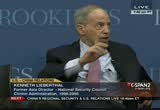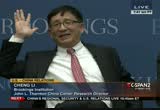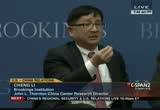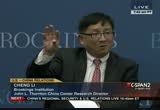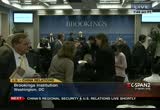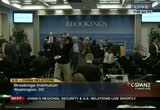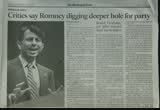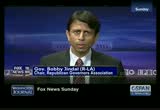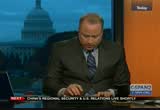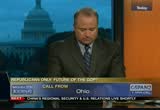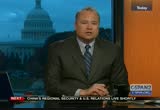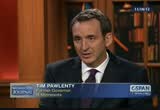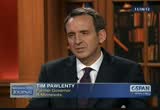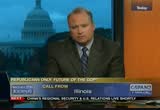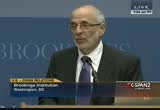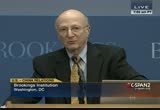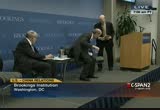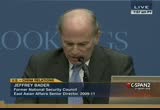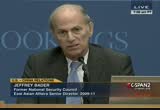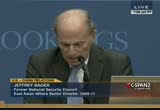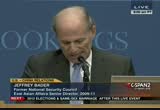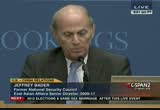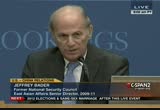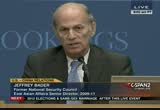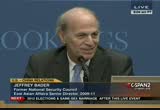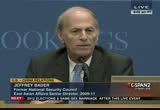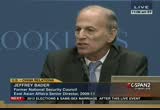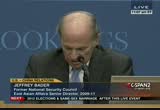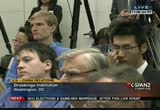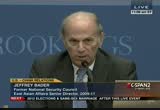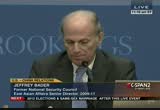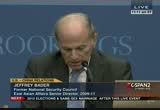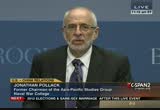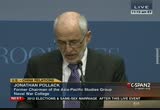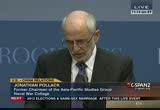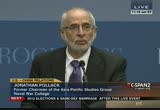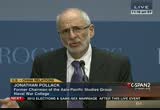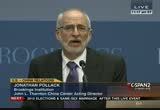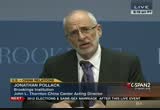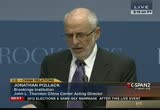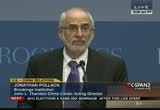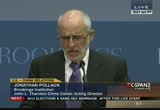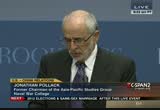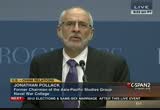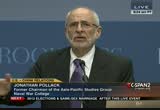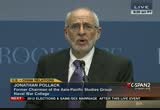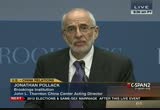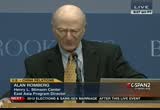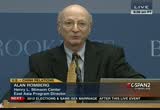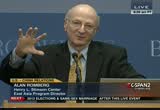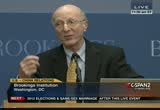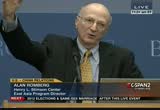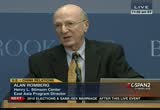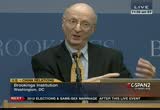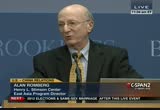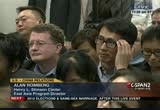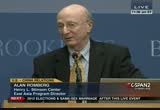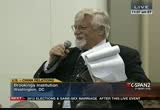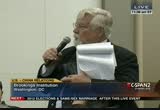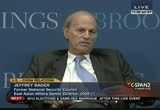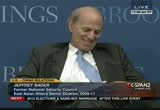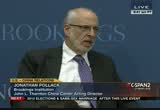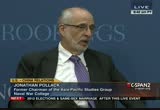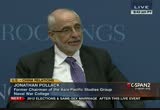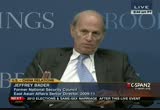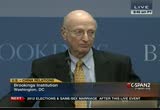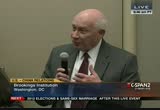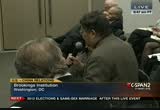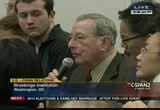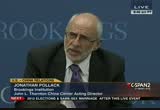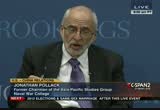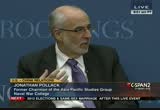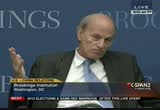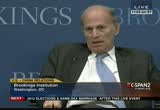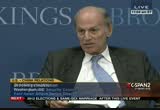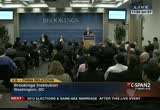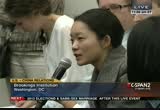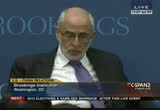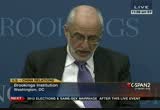tv U.S. Senate CSPAN November 19, 2012 8:30am-12:00pm EST
8:30 am
change in current law, every political candidate will have their own superpac. the atlantic, aspen institute and the newseum co-hosted this annual event called the washington ideas forum. it's about a half an hour. >> so next we have, we're going to find out whether the billionaires got their money's worth this campaign, and where all that money went. with trevor potter who is general counsel of mccain, john mccain's campaign and a lawyer at kaplan and drysdale. [audio difficulty] >> -- way for us, which is --
8:31 am
[applause] [audio difficulty] >> the colbert superpac. [laughter] so he's been on colbert many, many times, and this little segment is colbert handing off his pac to john mccain, all of which -- according to trevor -- to jon stewart, is perfectly legal. all right. cue the tape. >> can i run for president and keep my superpac? don't sugar coat it. >> no. >> okay. that's a little less sugar than i was hoping for. [laughter] >> you could have it run by somebody else. >> wait, what? what? someone else can take it over? >> yes. but someone who you would not be coordinating with in terms of pac ads and strategy.
8:32 am
>> oh, trevor, i wouldn't want to even create the appearance of electoral skull dug erie, if that's a word i can say on a family show. [laughter] but i think, i think there may be a guy. jon? jon stewart, everybody! trevor, if you will, colbert superpac transfer activate. [laughter] [cheers and applause] >> colbert, colbert, colbert superpac is dead. [laughter] >> but it has been reborn. [laughter]
8:33 am
>> the definitely not coordinating with stephen colbert superpac! >> well, now that that's all cleared up, nation, i have a major announcement to make. for over a day now, the people of south carolina have been crying out for someone who can restore our nation's former greatness to its current perfection. well, america, that someone is now. i am proud to announce that i am forming an exploratory committee -- [laughter] to lay the ground work for my possible candidacy for the president of the united states of south carolina. i'm doing it! [cheers and applause] and with your help and possibly with the help of some sort of outside group that i am not coordinating with, we can explore -- [inaudible] thank you, god bless you all, and god bless citizens united.
8:34 am
[laughter] folk, now that the results are in, i have a major announcement to make. i will give the ore networks a moment -- the other networks a moment to wreak into their programming to carry this live. [laughter] that outta do it. okay. my fellow americans of south carolina, while your turnout on saturday was historic, unfortunately -- and no one could have predicted this -- herman cain did not win the south carolina primary. so it is with a heavy heart and a spastic colon -- [laughter] that i am rhesus pending herman cain's suspending campaign. also i am hereby officially ending my exploratory committee to run for president of the united states of south carolina. i know, i know. because since i am no longer a possible candidate, i am officially offering to retake
8:35 am
control of the definitely not coordinating with stephen colbert superpac. to give it back to me, ladies and gentlemen, please welcome jon stewart. jon? [cheers and applause] where's jon? jon? where's jon? [laughter] he's at "the daily show"? [laughter] jimmy, open up the satellite link to the daily. jon? jon, what is going on? remember when you gave me the superpac, remember how we didn't coordinate that you would give it back the me if i decided not to run? >> i do remember not coordinating that. >> well, jon, i'm not running, so let's sign the transfer papers. did trevor send them to you? >> oh, yeah, trevor -- oh, i think he did. hold on.
8:36 am
boom! [laughter] >> it's my money. >> they're fueling my zeppelin, steven, sorry, i can't talk right now. i gotta go! >> stewart! [cheers and applause] >> what a pleasant surprise. [laughter] i was just -- >> you know why i'm here, jon. >> valentine's day isn't for two weeks. [laughter] >> you have something that belongs to me. >> immersion blenders for my butternut squash soup. [laughter] you're not getting that superpac back, colbert! >> i want my unlimited money, jon! >> you don't treat that money well. you didn't understand that money, you don't know what it's like! [laughter] ♪ ♪
8:37 am
>> hey, buddy. [laughter] >> it's over, jon. >> we can share the money. i don't need all of it, i just need some of it. [laughter] >> shh. >> think of the money, and i just really don't think that i could -- >> shh. jon -- >> don't make me give it back, stephen. i can't give the money back. >> don't worry, jon, you don't have to give the money back. ♪ ♪ >> no! >> you don't have to give it to me, jon, i'm going to take it from you. >> stephen, come back here! >> superpac!
8:38 am
[cheers and applause] prison. [applause] >> that was, that was actually pretty surreal. >> that's a lot like what it was like -- >> i was wondering, did you and david axlerod do that -- >> yeah, i wish i still had the green inside me, so i could show everybody. no, it wasn't exactly like that. >> stephen colbert wound up with $800,000 in the back -- in the bank for his superpac, and you've arranged for him to cope that. >> actually, it's disappearing. >> pretty much everybody else found a way to spend theirs in. >> did you in. >> just about. we had to pay the lawyers. >> and it was more than a billion dollars of spending by outside groups overall in the cycle. >> uh-huh. >> something like 13 -- i think it's more than the last 11
8:39 am
cycles combined, the outside spending. but the argument's being made that a lot of the largest donors didn't get much more their money, that we wound up with, in some respects, a shadow election. does it turn out that turnout doesn't matter that much? the influence of superpacs has been exaggerated? >> i think we're just beginning to see the influence of superpacs and their nonprofit affiliates and how that plays out. first of all, on the democratic side it turns out that their zucchini pacs had -- superpacs had a pretty good day, and on the republican and democratic side, i think the donors are going to find they had a pretty good investment. because while the big republican superpacs were, had terrible battle averages -- batting averages, their major donors are now known to the party, they're
8:40 am
known to the congressional leadership. certainly the republican party is going to hope to convince those donors to play a significant role in the midterm elections, and i think as a result they are now the elite of american politics when it comes to their ability to get phone calls returned and the interest that the party is going to show them going forward. >> do you agree with that overall assessment? or do you think there's going to be donor fatigue after this cycle, people are going to pull back, wonder if it's worth it to expose themselves the way they did? some of these donors came in for some pretty negative attention from the press. >> uh-huh. i think as long as the rules are in place, i think there are going to be politicians who have wealthy benefactors who want to see thai elected or reelected, and regardless of how people think the republican superpacs did this time around, i think there will be people who pony up to make sure those groups go.
8:41 am
just a quick defense of the republican superpacs that were out there for mitt romney, i would say that their biggest problem was that they were in support of mitt romney's campaign which never gave a clear sense of what direction their campaign was going in. and as a result, you didn't know what kind of story mitt romney was trying to tell about himself, what he was trying to say about the president or really what he was doing on a day-to-day basis. when he was advertising on welfare reform and the war on religion, i think the republican superpacs you're probably thinking what on earth are we doing here? >> so what you're saying is they were -- they need to get better at not coordinating their campaigns? [laughter] >> it's not even a matter of coordination, it's a matter of strategic direction, and the romney campaign never had one. and on the obama side, it was pretty clear his campaign was about the middle class. and every single ad we ran was if mitt romney wins, the middle class loses. so i think there was a much
8:42 am
clearer lane for us to swim in than on the romney side. were they supposed to defend against the bain attacks? were today supposed to bet -- get into the welfare reform game? it was unclear. >> look, though, you run a superpac. do you think they're good for america? >> no. i think a system where you can give unlimited contributions and in some cases not disclose who those contributions come from is not something that's particularly a good thing for the country. our view is that even though we were against citizens united, even though we support campaign finance reform, as long as karl rove and the koch brothers were going to have hundreds of millions of dollars in this election, we were going to make sure that somebody had the president's back and not, you know, and not just sit on the sidelines while all that money was being spent. >> so that means we now have a bipartisan consensus. because newt gingrich was on "the colbert report" or last night saying that superpacs were the worst thing ever to happen to america -- [laughter] >> except that the months that
8:43 am
it saved his campaign -- >> i was going to say, even though his campaign only existed because of the superpac, that he thought it was a mistake. [laughter] so maybe there's a bipartisan consensus to do something. >> do you see any prospect of that, the politics changing? >> i actually do. first of all, superpacs were not actually the creation of the supreme court in the citizens united which is to say that the court said all this spending was going to be fully disclosed, and it was going to be totally incompetent of campaigns and parties -- independent of campaigns and parties. that's not what we have. so i think the courts would allow regulations that would insure full disclosure including from the nonprofits. they would, they assumed that these pacs were going to be much more independent of candidates than they are, that candidates wouldn't be fundraising for them or having former top aides create them. so i think those are things that can be done within our existing legal system with citizens united still in place.
8:44 am
and i also think there are a lot of people in this election who experienced superpacs firsthand, a number of them are now members of congress, and i suspect they are not happy with the way this developed. partly that for selfish reasons which is they felt they lost control of their message, and the superpacs ended up spending more than they did in some of these races. but also it puts them in a situation now that they're incumbents where they have to raise even more money than they had to raise before which was pretty bad because they don't know what's coming in the next election. >> do you agree with that? talk a little bit about what it feels like to be inside a campaign when there's so many outside players coming in. i mean, does it panic the candidate, the a campaign manager to feel like they're not controlling the message one way or another? >> it can, because already a lot of attention gets focused on the really big players, the crossroads of the world, restore our future, americans for
8:45 am
prosperity. but what actually happens in a lot of congressional campaigns, you can be a candidate in the suburbs of philadelphia and go all the way through the race, and maybe you get a couple ads run against you by some outside groups, and then the last couple of weeks all these new groups pop up, and, boom, you've got 11 groups spending money against you, and you don't know what's going to happen really. and so i think that when you're a candidate, it can be a very frightening thing. ..
8:46 am
>> they all one after i all in for cut medicare. clearly some bright consultant said the focus groups show this is good with elderly voters. the problem is that the underlying republican message, the chamber of commerce, the business groups that were paying for all these ads is they want medicare reform and they want budget reform. so they ended up with a message that is contrary to their actual goal. sure, they wanted alan by down the line they want things from congress and they now scared every other and come thinks they're going to get millions of dollars spinning against them if they touch medicare. so it's sort of a
8:47 am
counterintuitive approach to what they ultimately want. spin bill, let me ask you something specific that john mccain said this morning. which is interesting for a couple reasons. he was criticizing president obama's campaign and he said here on the stage upstairs, i would never run a campaign like the. i would rather lose than accuse someone of being responsible for someone to
8:50 am
the president doesn't end up with a blame because he isn't at the end of the ad saying i'm brought obama and i approve this message. instead, some group that no one has ever heard of did this and the president, if necessary, as gingrich did in his primary campaign can go out and say i don't like the at and i wish they were not running it. but the damage is done. they end up having enough distance from the president, or their own candidate. these are in the since i think super pacs are effective at running virtually 100% negative
8:51 am
ads in a way that the candidates themselves wouldn't dare do it because they would get blamed for them to add that i think is what's a problem for our system. >> was the future for priorities the u.s.a. by the way. what do you imagine doing? >> this is a big team effort. we brought on mary beth and paul and jeff. some of us can't just pull look, we are spending these next days and weeks talking about what happened next force. we built up somewhat of a brand in washington at least and we have a donor base and it doesn't seem like crossroads is going away or the chamber will stop spending money. so we're thinking about what's the best next step. >> so that's the future, is life for the super pacs. they turn into lobbying organizations because they've got all these people. they're being i assume paid enough to pay the rent, and they
8:52 am
have a brand. that's exactly what you're hearing from american crossroads. plus the addition that to the extent they're doing this through nonprofits they actually need to lobby to keep their irs status. they have done all this campaign activity and that sec for they need to produce lobbying and noncampaign activity to prove the the iris they aren't just doing politics. so what you have is a donor network, the competent professionals who take those political skills, turned into lobbying, turned into being in some ways the soft-money shadow group for the party committees. because they of course can take unlimited money from any of these sources spent just a quick aside, when we started we were so broke we spent months doing meetings in the lobby of the mayflower and when we finally did get office space with only had enough to sign a lease that went to october 31. so we spent the last week of the election kind of on the streets
8:53 am
basically. it all ended the way it started, homeless. >> an important will come it took you long time to get traction with the democratic donor base that was resistant to the idea. where did that resistance come from and is now a thing of the past? >> is not a thing of the past because i think democrats at the core are against these outside money groups. there was not immediately had with a donor with a donor didn't say even if they gave, most of the means where the donor did give government didn't sit down and said we're going to for the most part. they all said i really don't like this kind of group, but if paul rhodes we doing i understand we've got to do something on our side. so this democratic resistance i think. mostly because the president himself in 2008 said if you want to support my campaign, do it through my campaign. don't support these outside of the so we shut down. it was pretty awkward for me because they're all these quotes out there for me personally
8:54 am
trying to shut down the groups. but ultimately i think democrats want a different kind of campaign finance system, and so it's awkward to support a group like this. but there is support for it in this environment and so i don't think, the system will dissolve just because there's resistance. >> trevor, i often feel like when you talk to political operatives on both sides and found risers on both sides, and donors, you hear from a strong word but this is kind of self hating core to the people are participating in this system that feel trapped. this thing is just going to go on and, therefore, they'll play and get used to. is that what is sustained this? what is it that keeps it going? >> during the course of the campaign i a chance to talk to a range of major republican donors comment and even victimized even they because i think republicans were interested in the super pacs, the party had embraced
8:55 am
of them and citizens united. but i found romney donors saying to me this is terrible. i don't want to be able to write an unlimited check. this is not our president ought to get selected. we need to talk about this after the election. so, you know, now think one of the things that i will be doing is circling back around and saying, so are you interested in changing the system? if you look at it even the candidates are prisoners of this, not necessarily just the super pacs but this is the first presidential election in which neither candidate participate in the public financing system. mccain having been the chump we did last time i got wiped out by the obama campaign in terms of fundraising, neither were going to take the what now turns out to be a measly $100 million check from the federal government. but the result is, the numbers i saw was the president had over 200 fundraisers for his campaign and for the dnc.
8:56 am
you compare the speed at this is a cvs statistics, and i find is a telling. the president attended 221 fundraisers and 24 states. over the same period he attended 101 political rallies in nine states. >> the statistics that you can present to you is that when ronald reagan ran for reelection in 1984, similar situation come here to raise money for his primary and the party even though he took the public general election funding, he attended for fundraisers in that year. what are we doing where we have a president running around? as i recall, the nevada event that romney hit import into the rushing off after libya was a fundraiser. a fourth of his time in office is this election year and a spinning it at fundraisers. and romney is getting videotaped at his fundraisers talking about the 47% in a private, closed room with people, that's what
8:57 am
they want to hear and that's who he is meeting with all the time. so this is a problem for i think both sides, and we're going to see that pressure, the money pressure in the house and senate races. >> we'll have a minute left but i would love to hear if there is action of some sort taken to compel disclosure or to higher degree of independence or whatever steps, measures you face. conjure a vision of the future two, three, four cycles down the road what our politics is going to look like. you were describing a minute ago the growth of a new party structure that would be composed of these sorts of organizations, the old structure which is withering away, maybe completely. what do you think, bill? what you think running a campaign would be like? >> i think crossroads is a de facto republican party doing a lot of the work you think they were doing. but i think that when we take from this election setbacks can be extraordinarily important but especially in a primary. and i think early super package
8:58 am
support will matter as much as early primary state support for each one of these candidates. >> and if this goes wrong, if we keep going down this track and what we'll see is that every house and every senate candidate and certainly incumbents has their own candidates to protect. ahead of the fundraising committee is then going to turn around and give a million dollars or $2 million to create a super pac. so you're going have these enormous sums that we found in watergate where you're corrupting which this report so we can regulate. they will be routine and house and senate races. that's if they goes wrong, if we had down the path we are going. >> routine even at the level the average house race anywhere in the country, do you think? >> bill is absolutely. this cycle, their house races were candidates were supported by independent super pacs better not to to of been created at the candidates mother. [laughter] or brother, both of those here in connecticut there was a house
8:59 am
race very much like bill was describing where in the last two weeks millions of dollars that appeared out of nowhere traceable to ohio nonprofit that in have any existence except a p.o. box. >> will we ever know who was responsible speak with not under current law. that's why we need to change it. >> thank you both very much for your time. and you all for your attention at. at. [applause] >> i'm margaret carlson and i approve the panel. spent in just a moment we were returned to the washington ideas for him to do from senate and klobuchar on the role of women in the news sent. later we will be live as foreign policy analysts examine the chinese leadership rely me and what it means to future u.s.-china relations. >> also today, ceo of a nasdaq
9:00 am
stock exchange talked about the so-called fiscal cliff and its impact on capital markets and the u.s. and global economies. according to the congressional budget office a series of budget cuts and tax increases scheduled to take effect in january could put the country back into a recession if congress does not act. you can see his remarks live at 1 p.m. eastern over on c-span. >> now, more from the washington ideas for them. another. >> with newly reelected senator amy klobuchar our who discusses the role women will be playing in the senate's legislative process. the new 113th congress will have 20 fema centers, the most in u.s. history. from the museum in washington, d.c., this is about 15 minutes. >> next we have katty kay of the bbc interviewing senator amy
9:01 am
klobuchar our who just killed in this election. she won in minnesota by 35 points. people are saying she owns the state like hubert humphrey. and is better looking. [applause] >> well, thank you very much for joining us here. congratulations on your victory. convincing. not a tight race up there in minnesota. >> no. it was actually a lot of fun in our state. we had some amendments that were divisive and no one ever thought we could beat them. we did, and so the voter turnout in minnesota was 76% of eligible voters. [applause] >> and now, of course, you will join a new senate make up in january in which there will be 20% participation by women. >> that's right. 21 for the first time in history.
9:02 am
i was telling katty, i was in the green room about, this morning we for the first time had a traffic jam in the women's center's bathroom a. [laughter] never happened. >> there's only two stalls are not going to say who that would be. there were five of us in there. so it's very exciting speak so, you know, things are good for women in politics spent and the women's center's group is very collegial. we have 17 of us now. with dinner every other month in the strom thurmond room, which is somewhat funny for anyone who remembers his stories, with the statute of the strom looking down on a. [laughter] and whatever is said in that room stays in the room. we never talk about the male senators. just kidding. but it's been, engines of all seriousness, the group has worked well together, sometimes all of us on legislation, especially with respect to women's health and burma and other things.
9:03 am
but mostly we forge these relations -- relationships. kay bailey and i get a bunch of things on the commerce committee. and there are a number of women that are problem solvers, and i think you saw that coming through in this election with the election of people like heidi heitkamp in a race she thought no one could win but they saw someone who would compromise and get things done. there was someone who studied women elected officials allow back in boston who had this quote, not exactly accurate but she said that women politicians speak softly and carry a big statistic. i don't really think they speak softly anymore, but there is a model of women who have had to come through the ranks against all odds with a focus more on accountability. when i was running for county attorney i would look at the records of janet napolitano as governor of arizona, kathleen sebelius in kansas because on their website, they showed what their goals were and what they
9:04 am
got done. and i think you see that in some of the women come and actually some of the male senators as well that made it to this election but while the balance of power stay the same in washington, there was definitely a rejection of people have a rigid ideology. people want to see things get done and copper much. they did want to see people swinging at each other from opposite corners of the boxing ring. >> the sometimes generations about how women to manage things everything in businesses it women tend to be more consensual. we all are good at co-oping. is that your experience in politics? and do you think it matters to the population in general? we seem to have a few men and the audience, but doesn't matter to them there are more men in politics is low? >> any of them have daughters and they think it's great to see more women in power as role models for the own daughters, and i deeply there's just a different spirit. you look at the last year and is to come and i would argue despite the public image of
9:05 am
congress right now, the senate action was moving things after the debt ceiling debacle. we got to the patent reform bill, you go through this, about six bills that got been innocent. marching through votes on multiple amendments. but what's interesting about it, given the percentage of women, 17 right now, some of the most successful efforts were led by the women. barbara boxer against all odds work out a deal with jim inhofe. they're not exactly the same ideologically, and got the transportation bill done. susan collins got the postal reform bill done. it's still sunny over in the house, and debbie stabenow who had a heroic effort on the farm bill. so you do see the results. it's not just talking rhetoric of the women as problem solvers. you have seen them get things done. i think there's a different attitude and also we help each other across the aisle. >> i seem to say that women on capital propose more bills and more bills and managed to get than their male counterparts do.
9:06 am
i think you by do something about this election that wanted action from congress. do you think the public is going to be rewarded by a congress that is actually going to be able to get more done question mentioned the senate but a lot of those bills have ended up stuck in the house. will this congress build get more done than the last one? >> i don't think there's a choice. anyone who's looked at this election is talk to people out in their states know that's what people want to our country can't stand still anymore. we have an obligation to bring the debt down. i think it should be in a balanced way and i think the electorate spoke loudly on that point, but we need to do that. we need to do some positive things for the economy, and i look at everything from making sure that our workers are getting the degrees they need, including in science, technology, engineering and math, we should be doing much or at the high school level with one and two years decrease. the opportunity of immigration reform that came out loud and clear through this election where you have now 10% of the electorate, hispanic 75% of them
9:07 am
voting for the president and you are already hearing many other republicans starting to talk about the possibility of moving on immigration reform. so there are some real opportunities that will move our economy along. if we can compromise a get together on debt, do something insist on tax reform, and then work on these problems like energy, comprehensive energy problems that are opportunity and making. so i am much were optimistic than some. imagine hubert humphrey. actually the original he gave me gordon humphrey suggested by mistake or little-known senator from new hampshire. but eventually they corrected it. >> the president has just given a press covers but i do not get the chance to hear it but he was sounding feisty on the issue of taxes. he seemed to be saying that he was given a mandate in this election by the american people, not to continue with tax cuts for the wealthiest americans.
9:08 am
he said if there is one difference between mitt romney and his campaign, it was that he opposes the idea of the wealthiest continuing to have those tax cuts. if that is the position of the president and it continues to be the position of the democrats, isn't going to hold things up in terms of budget negotiation with republican colleagues? >> i look at this one simple way and that is i want to bring the debt debt. when you look at the bush tax cuts, and the way i explain to people in my state is people making over $250,000 a year, the first $250,000 would be taxed at the bush level even if they make 1 million. after that it goes to the current level. why is that important? it saves about $700 billion over 10 years on the debt. that's why we're so interested in that particular proposal. iran on a six years ago. iran on it because i see it as a way to bring in the money. it's not about taxing the wealthy. it's about what are some smart ways we can do this.
9:09 am
and one of them is that. the other is spending cuts. it has be a shared sacrifice. i think people are ready for and that's what the president is referring to. if it was brought in a small amount of money thing you could say it's symbolic. it brings in a big chunk of change that could help us to bring the debt down when you and that to the spending cuts in some of the other subsidies and other things that could be cut to allocate one example. at the know, i believe in biofuels or 10% over fuel supply right now. those breaks are basically gone we. that was $60 billion in 10 years. oil is $40 billion in tenuous. it's still there and we are proud of the oil drilling that's going on in the midwest and the natural gas extraction anything happen. the question is do we do -- do we still need the. there's a reason and a very
9:10 am
rational reason we should be talking about these things. it's not just about politics. it's about how to we rationally bring down this debt over 10 years without creating some kind of sharp contraction for the economy and able to do it with the political support you need to get it done, but where is the money that is there so we can really bring the debt down and then and courage that investment from the world, make people realize our economy is solvent and move forward in a rational way. >> not the idea that washington isn't about politics. spent if you just listen -- >> what did bill clinton say? >> arithmetic. i like that moment for two reason. he was on a partisan pace and he was pointing out what numbers added up and wanted me but i also like the democrats were all chanting for arithmetic because i think both sides are going to have to realize that this has to add up and it can't just the sound bites on tv. the last thing i was to give me hope, i marched to all those
9:11 am
bills. those are real bills that got passed, midsize, confidence. it was only 62-75 votes in the u.s. senate. we beat the filibuster and guided them. so that should give you hope that it didn't do is possible in the senate, and on some of those bills the majority of them, after we got down there was pressure on the house to get it done. there's a group of us have been supportive of the debt commission report, the general framework agreement agree with everything anybody has continued to push and meet. it somewhere between, depending on the day, 40-55 senators are so that's been meeting off and on for the last year to try to push those things through. there's a devotion to getting it done in the senate. >> but you still of senior republicans, including paul ryan who sang it's not an intention to raise tax rates. they want to do this with loopholes. what they say is they don't want to agree to tax hikes now, spending cuts that they don't think will ever materialize.
9:12 am
how are you going to work with republicans in the house, if they're going to carry on saying listen, this is not something we're going to go sheet on as they have for the last two years to get to that make up you have to deal with. >> there has been some change there, and speaker boehner has put up with you all that branch and signified he is willing to talk. that's what negotiations are about. i just look out the clinton, bush tax cut issue and where you put the rates as a major part of the solution when you look at the amount of money you could bring in and you add that into some of the deductions we're talking about, but that is a big chunk of change. >> and in a press conference he just did, the president seemed to -- >> one of my colleagues from where this enemies i missed it, they did pass their blackberry over commission to show show me that since. so, you know, clearly is showing flexibility which i think is important. clear the republicans in the house have to, to. >> this will be a congress where you think by the end of this year hopefully sort out the
9:13 am
fiscal cliff. are you confident of that? >> i think will have to sort it out part of it and sorted under clinton afford. i do think every key will be crossed and every eye will be guided by the something's we should be done at the end of the year. there's doctors reimbursement issue. there's going to be the estate tax issue to try to keep those extensions in place where they are now. there's a number things i should be done at the end of the year and then some that could be extended as long as it is very clear there's an end date two, three months, whatever we want to be. the comprehensive taxes from which is the toughest thing and it's going to be a businesslike. the hope is if you look at simpson-bowles, the suggestion there is to bring the business tax rate down and pay for it by plugging these loopholes in getting rid of some of subsidies. a lot of my businesses in my state, we brought the world everything from the pacemaker to the post-it note. they want to see that business tax return and they're willing to talk about closing loopholes,
9:14 am
getting rid of some the subsidies to do that. but that's going to be major debate that could never be concluded by the end of the year, the entire comprehensive tax reform. but that is got to be the next thing that we tackled. >> you mentioned the consequences of this, of course this election has been watched around the world to american elections always are by this time around there was concern around the world and if financial markets about whether america basically has become ungovernable. debut is america needs to do big things to stay competitive and the politicians are not up to it. are you going to defy the financial markets is patient's? >> i think so. what is it that your grade reader winston churchill, we tried everything and then we get right. i think you've seen it in a number of instances in the last decade with a touch. it has been frustrating. but we have been able, whether it was the much aligned t.a.r.p. bill and realize the fiscal cliff back when the economy started sinking and we had all
9:15 am
those problems a few years back. were able to get our act together. what i want more than just getting our act together on the fiscal issues is just seize opportunities that we have now with the economy. we are actually making steps in american. we're exporting to a to a group where inventing things. that is the way we truly crawl out of this. i see it in our state, we are down to i think if i put a% unemployment. a lot of that has to do with high-tech manufacturing. it has to do with exports. we are at high export state, and having an educated workforce but i think the model when you look at the rest of the country when you're stunned as a number of midwestern states with improvements is the model. i have been meeting with roy blunt on companies come innovation and export promotion, so that's our focus to are the focus is tourism. another area we have lost 16% of the international market since 9/11 because we did get our act together on how we do that. i bring that up because just
9:16 am
adding a point back is 160,000 jobs in america. your country, in terms of getting the visas processed faster pixel for a while if you're in shanghai and wanted to go to london, it took 10 days. it was taking 90 days to go to america. now with the help of the state department have greatly improved that. but that is when is apple and ask the tip of the iceberg of course on immigration reform when you look at h-1b jesus. -- h-1b visas. senator mikulski a, senator kirk, senator blunt. what people than willing to step out on the visa issue on tourism, and i think that that should soon extend into immigration reform which senator graham and senator schumer are working on. >> on yesterday morning you mentioned there was a risk of course of losing some democrats and the senate if republicans didn't compromise as well.
9:17 am
the democrats going to be tough on these things is look at what is theirs that you would like ideally that you are prepared to compromise on should it come to that over the budget the? >> there were a number of democrats didn't want to see the spending cuts that we saw out of the budget control act in which as you know we already did when truly and 10 years the sequestration is another one point to try and buy this year. these are automatic cuts. i would prefer that we negotiate something to tell you much better but a key providing the people in my state that if you're going to do this we are going to to make some cuts. so i think that's number one thing on our site is to acknowledge that there are going to be spending cuts. you see people even with the budget control act, there was some democrats that did not vote for the. in my postage of the interesting coalition, senator franken i myself voted for it, a couple of the republicans in the middle voted for and democrats, and then you had keith ellison has a more liberal democratic
9:18 am
congressman vote against it, and michele bachmann vote against it. they voted the same pic and i think you're going to see some of that with a debt ceiling and everyone knows that. where some of these bills have been more republicans not voting with it, made how the republicans voting with us, you'll have democrats not voting for us on a debt ceiling. so that's what is a more important that the republicans work with the so we have enough numbers to get it to the senate and through the house. >> let's hope it's going to be -- [inaudible] thank you very much. [applause] >> also today on this been -- spent u.s.-china relations, foreign policy and china scholars will talk about political economic and national security challenges. notable speakers today will include the former u.s.
9:19 am
ambassador to china, stapleton roy, and the former chair of the asia-pacific studies group at the naval war college, jonathan pollack. live coverage underway now on c-span2. >> this morning, we plan to review the political outcomes that we have observed in both systems, ask what they could foretell about the future political and economic directions in terms of debate in both countries. note some of the major challenges that i think confront both curatorships, and then assess the possible implications for u.s.-china relations and east asia as a whole. our focus, not surprisingly, will be much more on the chinese side of the story. i think that this reflects the enormity of the challenges both internal and external that china confronts. the extent of leadership
9:20 am
turnover in china. the question of whether new leaders will follow an old script, or whether they will pursue very different paths than their predecessors in office. at the same time of course the united states confronts prodigious challenges of its own, even as president obama must replace many of the league officials who have been responsible for the formulation of u.s.-china policy during his first term. so the question, it seems to me, as some of them are quite obvious but it's important to save some of them at the outset. should we anticipate continuity or discontinuity in the bilateral relationship? how would both leadership seek to protect and advance their interests? will this reinforce or undermine the capacity and incentives of both leaderships to cooperate on
9:21 am
pressing international issues? and what of course are the potential consequences if there is increased stress in an additional fault lines introduced into the bilateral relationship? and last, what should we be looking for and anticipating in the weeks and months ahead? i'm joined this win by three of my colleagues from the john l. thorne china sent to come and buy two distinguished experts from other institutions here in washington. who will respond to the presentations by the panelists, and then moderate the ensuing discussions. we will of course try to allow for as much time as possible in questions from the audience. our opening panel will address china's in leadership and its prospects. i'm joined by my colleagues, jangly. -- chang lee, a senior fellow interest of research in the thorne center, by ken lieberthal, a senior fellow and
9:22 am
past director of the john l. thorne center, and then to be followed by the stapleton roy, former u.s. ambassador to china and director of the kissinger institute at the woodrow wilson international center for scholars. and then this afternoon i outlined from the east-west center. answer, stimson center. i knew i had but anyhow. in any event, since chang's presentation involves some slides at the outset, we will let him go first. and then the rest of us will join him on the stage. so, the floor is yours. >> thank you, jonathan. and i'm honored to speak to you, and also speak along with ambassador roy and kenneth, whose writings have profoundly shaped my thinking and the
9:23 am
writing on chinese policies over the past 20 years. and in my presentation, i would cover the aspects. first, discuss about the scale and scope of the leadership change. second, main characteristics of the new leadership by looking at their career paths, educational, action identity, and third, i would discuss what i believe main issues emerging from the party congress and from the new leadership. the first, the scale and scope of leadership change. now, this is the overview a just completed two days ago, and look at the six major organizations elect, well, elected or selected as the 18th party congress. they don't call our new members. and first column also include
9:24 am
others to form and. so out of the 376, 240 our new members. it's about 64% turnover rate. and inspection commission, altogether 30 members. 100 r. newcomb about 77%. and the secretary of the orchestration in charge of daily affairs, very important organization altogether seven members. only one is old. so 86%. and a powerful politburo, 25 members, 15 our new members. in the politburo standing committee, seven. and as we now five our new. 71%. and the commission, 11 members, seven our new. if you consider the military members actually, percentage isn't 70%.
9:25 am
so it's very much as we previously predicted. now, this turnover, compared with the previous party congress, so this is a teen just completed 64%. so it's the second highest turnover rate. the highest occur 25 years ago in the 13th party congress, 68%. so chinese congress party, despite one parties monopoly, turnover rate is quite impressive. probably higher than our congress and then european parliament members. now, let's also look at the institutional norm and the rules, despite the criticisms we've heard and also will and my criticism. it is by and large the second peaceful congress in power. that action is quite remarkable development. now, also some of the major norms and rules actually fall
9:26 am
over age limit. anyone who was born before 1944 in the previous party congress, party central committee, retired. and also there's a regional. craddock representation, spent most of the last three days packaging systems. 62 leaders, four members serve as provincial leaders change as we know. in china, 31 provincial level entities. each province are major city has two people. that will also follow, except -- [inaudible], probably for recent of maybe party is eliminate. so they have three members. that's again father praises. every military district, two
9:27 am
members and as such. so this norm largely follow. now, ours shall -- also there's this doctor, started 1987, which basically gave about 10% more candidates on the ballot. the bottom 10% eliminate. now, people eliminated including the minister of commerce, minister of in the rc, and the minister of supervision, rising star, very, very powerful woman also eliminate. some people are not in the ballot even, including governor, minister, and also very powerful military figure who raised some criticism early on. is a powerful man. so this is a limitation.
9:28 am
certainly the most dramatic. according to some source is he was considered as politburo member and vice premier but he could not make it to the central committee. so that's one of the big news. now also i think the most important development is a decision to step down as chairman of cnc. we cannot estimate significance of that development. because otherwise jinping surrounded by retired bosses. by stepping down, that important position, really consolidates the relationship between the party, the army and the state. so it's a great contribution. now, i also should say that some of the elections, particularly the three things, the norms, is not new. it's not about china 20 years ago.
9:29 am
[inaudible] difference largest increase one or 2%. you know, election, eliminate the number. 25 years, only 1%. that's the progress. so in a way it is embarrassing. now, this is the top seven. the lucky seven. several things. one is the age. five years ago xi jinping was younger member of standing committee. five years later they are still youngest. so this means that in five years they would be a major change. so that will start immediately after the party congress, five years, not as long. secondly this is their position to all of these positions are very much already confirmed except it is unclear whether he will continue as vice president of prc. because wrote in beijing said would not make it to standing
9:30 am
committee will be vice president of prc. of course there's possibly up to vice chairman of prc, but we do not know. but all other is very much enough. the interesting thing is that this is not balance. we divided the camps. the core group of strengthening. many people in hong kong believe -- [inaudible] obligated affiliation, he is a closer hu jintao. so that's the may issue i think public reaction certainly focus on that's. now, this is an entire politburo, except the seven standing committee members, they are positioned very much decided, although there still
9:31 am
some changed in the state council membership, et cetera. the interesting thing is that being in politburo, hu jintao's camp had more seats. the ultimate it is more even, this 25 minister is there much like 13 versus 12. so in that level you do see the balance in politburo. many of them are -- [inaudible]. now, this is a new secretariat, which is in charge of the daily events come and only one new member is old. this is the portfolio. in charge of propaganda. announce with organization head. he will be in charge of general office. united front, although he is not director. he was a former director, and he will be in charge of discipline,
9:32 am
number two person in the discipline commission. and then a minority will be in charge of ethnicity and religion. based on that you will see the more emphasis on religion and also ethnicity being the secretary previously. no such position. that belongs to united front. now interesting also, not here, at least for members started their career, and this is half. [inaudible]. also filled with hu jintao for 30 years. so upperhand. so this is early on before the party congress talk about the military commission, as we know that seven of them retired, become aged, three of them remain. and they indeed remain at their
9:33 am
position in the central commission on the difference. one becomes vice chairman, to remain as members, not as people predicted as vice chairman. so this is commission, all seven have two or three step promotion. promoted to vice chairman. this is chairman all supposed to be vice chairman but he didn't get it. he will highly likely, minister of defense in state council. these or other important positions in the military. now, also some of them new members, 10 military members, seven our new. now, this is the composition, like the composition, it is not pronounce. they will still be changes in the next state council, but most of the room in beijing, have
9:34 am
conversion. these two are decided. he will become vice premier in china with agriculture. and this man will be -- [inaudible]. in charge of finance and trade. and state counselor, because based on beijing's rumor that she will take a portfolio of education and cultural of the. has military, dod, and he will be council and also general secretary chief of staff. the fourth one will become state counselor in charge of police, also of police. and, finally, this is a surprise. i still don't understand. he will be place someone. this does not happen but --
9:35 am
[inaudible] your largely move from chinese composition and also from propaganda. currently he serves as party secretary. this is big surprise. minister of foreign policy apparatus make sure short list. but we still keep for members of such a committee including youngest. there's a possibility yungas will become state counselor. is also possibility that someone will become in charge of foreign policy. it's unclear, also promoted. previously still currently in department head. and party secretary of the foreign minister. and in charge of hong kong affairs but now, the for financial teams in this is not list. there's a lot of important figures but these are the new members, including -- a protége
9:36 am
of wen jiabao. he has in the name. i don't know whether that is good or bad. he is quite brilliant. [inaudible] also make for members of senate committee. these two, state council development research center, isaac at least one of them will move up to be in charge of financial affairs. interestingly enough, these three are really -- but overall the returnees are very, very limited. in politburo last time was when. he got his degree from north korea. this time the same. but to people, when you're overseas, including who studied
9:37 am
in iowa and also worked at who is visiting scholar another person spent one year in uk. that's it. but the low-level is not clear. probably more i think. but high level is quite limited. in making the financial sector, et cetera. very quickly, second thing. several things, first is the career paths. this is the 25 members of the politburo. the previous, 19 of them, about 76%, three quarters had experience of party secretary, governor, or major city. so that's very important. so still leadership is a main career path. secondly, this is rise and
9:38 am
decline of technocrats they so i previous study. they can see that minister and party secretary government in 1988, 98 you almost do. almost one person at the time. but 1980s and increased dramatically. 1997 reached a peak come about three quarters, about 70%, i'm sorry. 2008, a decline. this decline very clear in the current politburo. the red color is standing committee. the other color is public or. this varies from years. as we know, 14th part of congress and also 16 party congress, all the standing committee members our engineers turned politicians. therefore, all technocrats, 100%. but started to decline last party congress.
9:39 am
now, this time in the standing committee only one person is a technocrats. in the politburo only few of them, 60%. so we really see dramatic decline of technocrats. now, this chart probably for most of western audience is not big deal, but in china could be sensational. because leaders always claim they have advanced degree, right? if you look at these degrees. most of them, events decrease, 88% are part-time degrees in china, means a lot of things. now, only to you, only to i think really finished their master degrees four times in the middle or early 1980s. now, also surprisingly at the undergraduate level degrees, eight of them, 32% are part-time
9:40 am
degrees. now, this -- [inaudible]. could be a serious criticism. on the other hand, some will be a very capable if they can prove their capacity now, the most important thing is about rise of princeling. this is in standing bureau. in terms of number of a number of princelings in number of persons. so this is just ever, 57% of princelings as i measured for members are princelings in the seven. the commission and the good news is the to princeling previously are gone. reduced percentage otherwise probably would be half, but now it's 36%. still compared with the previous
9:41 am
years it's unprecedentedly high. this is the criticism, particularly of the time people very critical about the corruption. and now we're finished in two minutes or three minutes, okay. but last point. the main issues in emerging from the party congress, i think for major issues. one is for me, for many of service is disappointment that they did not adopt more candidates than seats to the high level, meaning the politburo. they discussed that but eventually dropped. let's imagine if they introduce that mechanism, no matter whom they elect, this really gives them a new source of legitimacy, and new sources of mandate. but, unfortunately, that did not happen. you know, actually most candidates could still get to the politburo standing committee. only maybe a few will be a limited, but still because those are people who scare they will be eliminated, resist strongly. so in that regard i think it's very big disappointment if
9:42 am
opportunity this. secondly, sexual balance is really broken in the high level. that would be very, very costly. yes, the campus when a lot of seats but they will page -- a huge price, made a huge price and years to come. and thirdly, it's good news because now -- [inaudible] could not really move, particularly regarding economic and foreign policy. but now pushing paint has majority, and most of them are really capable in reforms to the water and the financial economic sector and the coastal region, so in that regard could be a very good news. they can resolve all reduce some of the policy deadlock. and, finally, is because of hu jintao and wen jiabao could that
9:43 am
make it to the standing committee as others argued, and because of lack of real election, so i think the political reform would delay. my sense is new leadership will continue to push for even economic reform because people say pollution now and wen jiabao did not do well in the country and others opportunity for them to prove they are capable economic administrator can maybe confidence. but at the same time we know at this rate of china's economic development requires political reform, requires rule of law, requires these efforts that was just lacking. thank you very much. [applause]
9:44 am
>> i want to fall in with some additional takes on 18th party congress and what it portends. it's always fun to follow cheng. i typically think it does nothing to add, given the scope of his remarks, but i'll cover some of the same ground but you see outcome at it from a slightly different angle, and hope to have some additional food for thought. first on the congress itself, i thought overall, this was not a very good show. it was divorced from public view, inviting social networks, and, frankly, i was in beijing during part of the congress, just talking to everyone. there's a lot of popular really cool in who is being conducted. there was mark including until the very last minute. in fact, it went to part of the congress. they were ugly revelations going
9:45 am
back to last spring that continued right up to the eve of the congress. the final choices i would argue were not necessarily driven by proven capability. all of these people at the top have a lot of capability, but when you look back at the records it's not at all easy to make the argument that those have demonstrated the greatest capability and problem management and executive initiative and so forth were the ones who made onto the standing committee. ..
9:46 am
>> to make serious decisions. i agree very much with cheng that hu jintao's willingness to give up his position as head of the military commission was very good news. it resolves a kind of anomaly with several precedents in china that produced very awkward, a very awkward position for the incoming party secretary and president. all politburo standing committee members are from the previous politburo, again, highlighting the kind of rules and continue fewty that you generally -- continuity that you generally see in china. age limits were adhered to, and this notion of having more candidates than positions for the central committee kid -- did have some consequences and was a policy continued from the past, albeit as cheng noted, not expanded. the major prommatic document
9:47 am
for -- programmatic document for congress that hu jintao gave at the opening session but let me note it was king ping who oversaw the drafting of that report, as was widely noted, that report gave strong endorsement to continuity and to the accomplishments of the past five years. not surprisingly hu, on his way out, affirmed he had done a very good job along with his colleagues. but there are a variety of lines and paragraphs sprinkled throughout the report that can be used by the new team if today wish to do so to pursue some real departures. and we've seen this before where what seems like an overwhelmingly kind of conservative, more of the same kind of document has a few things in it that in retrospect you see provide justification and legitimacy for significant new departures by the new people who take over.
9:48 am
here i would photoa strong endorsement of the separation -- stronger endorsement than i have seen. it's always mentioned, but this time it really got a very strong plug, and i thought it's a very important thing for them to pursue. the notion that everyone, and they stressed everyone, is subject to the law regardless of the level of political position. some nods in the direction of a nor independent judicial system and so forth. a number of things there that could be run with even though there were other major parts of the report that seemed to move in the opposite or at least a significantly different direction. so all of those things, to me, are elements that are somewhat positive coming out of this conference. more mixed was the fact that while i think they appropriately and understandably had a major focus on corruption and the need to deal with it, they equally strongly said it is the party that has the problem, and it is up to the party to fix it, which
9:49 am
is to say they are not going to go outside of the party for any kind of independent -- judicial or other body -- to clean up corruption in the party. they're going to rely on a corrupt party to clean up it own mess. and i think that's unfortunate because i don't think it has a very substantial chance of success even with someone as capable leading the effort. within a very constrained set of choices, if you look at the kind of rules of the game in china, today decided to select in addition to -- [inaudible] the five oldest people who are eligible for poll lis borrow -- politburo standing committee membership. given my age, i think that was a wise decision. [laughter] i like to see that precedent. even older would be a little better. no, but seriously, what this does is to set up a major transition five years from now, and five years from now, you know, you can never be sure, but
9:50 am
there's a good chance that gin ping will have much greater say in who comprises the rest of their team. this was a choice of five out of eight. there were only eight people they could choose from given their rules, and they systematically went for the five oldest of the eight. i think this showed both the partial institutionalization of the system and the sarp limits to date -- sharp limits to date on that institutionalization. here i want to posit eight begin givens and then make some additional judgments based on those eight as framing background. they are as follows. first, there is extremely widespread and serious recognition of the pressing need for major reforms. this is in terms -- the recognition is not only in terms of social tensions of which there are many and they are obvious, but also the analyses
9:51 am
by key economists, by key environmental specialists, by key people in the security lean ma and so forth. -- arena and so fort. so there is great pressure inside and outside of the political system for major reform. second, reforms need to be both economic and political. all of the major economic and social problems such as inequality of wealth, environmental degradation, overreliance on exports and fiscal investment, land seizures, massive corruption and so forth result from how the political system currently functions, not solely from economic policies. and, therefore, political fixes are necessary as part of dealing with these sometimes seemingly purely economic issues and sometimes broader issues. political reform here need not seriously move toward western-style democratization, but failure to deal with deeply ingrained political practices will sharply limit the economic and social improvements that can
9:52 am
be generated. third, reforms are necessary in the coming two years or so to avoid very deep problems a decade from i now. in this regard, china is kind of like the united states. we have major decisions we have to make in the next two years to bend the curves, and if we don't bend the curves on expenditures and income, ten years from now we are in deep, deep trouble. i would argue with all the details different in china, but that fundamental reality is the same. they've got to make some major decisions that they've already outlined, but they haven't implemented. they have to make major decisions to implement those changes in the next couple of years, or if you look at the curves, they're in deep, deep trouble ten years from now. fourth, work gin ping has not made his priorities clear either internally or publicly. his past records suggest he is both capable and cautious. so i've seen speculation about
9:53 am
his priorities and how strongly he'll pursue them almost across the board. again, in china talk to a number of people who you would think would know, and they're all over the lot too. so it's a little bit like barack obama in 2008. you can pour any content you want into this general image. we'll have to see what content is really there. fifth, most other politburo standing committee members likewise have not tipped their hands as to where they stand. either on individual reforms or on their overall priorities. you've got to keep in mind you can have a group of people, everyone favors reform, but in a political system you have to decide what's your top priority. what are you willing to really use your political capital for? and what's your second biggest priority? many because you're unlikely to get to your third, right? you see obama facing that now with, you know, climate change,
9:54 am
a fiscal deal, immigration, etc., etc., etc., right? the issue isn't whether he supports all of those, it's what is he really willing to go to the mat for, right? and i think what we face on the politburo standing committee may be a lot of people in favor of reform, but we don't have a clue as to whether they're prepared to go to the mat for the same reforms, right? and, therefore, whether they can reach agreement on tough decisions where they, with an agreed-upon priority for those decisions. the candidates who did tip their hands as to what changes they would like to see did not make it onto the standing committee. li, early on, yong and -- [inaudible] sixth, factional ties. ing cheng gave us information on them. i think they do not get you very far in anticipating substantive
9:55 am
positions and priorities. that's a level of detail that broad background relationships and associations with various top people over a period of years doesn't necessarily get you to. but substantive positions and priorities are very important for anticipating what the future is going to hold. seventh, substantively serious reform is a very complicated matter. much more complicated in china than in the u.s. given the array of reforms that are really core to each country's future. so you need to take that very complexity into account when you try to anticipate what's going to occur there. in china this requires changes in the development model that china is pursuing. and basically, changes from the former model to at least what they've anticipated, in fact, what they've stipulated in the 12th five-year plan. in longer or term something
9:56 am
close to what's in the world bank/drc report that came out last spring. these are very complicated and wide-ranging changes. there are deeply-rooted, vested interests that will oppose parts of the 12 five-year plan, and these are very powerful interests. just to tick them off, local territorial and party leaders. i'm sorry, local territorial political leaders. this is in part because they benefit enormously from the current development model, and they have a lot of power within their own bailiwicks and a lot of flexibility. it's in part, also, i've been startled as i've begun to get into this issue a little more, many of these positions are now bought and sold so that this is not necessarily a meritocracy moving up. people have to handle themselves effectively in these positions to move on, but then which of those people moves on is dictated a lot by how much money you've made and, therefore, have available the purchase the next
9:57 am
higher-level position. some 80,000 of these 40,000 territorial units, therefore, if you just look at the top two people in each, 80,000 people you're talking about. many of whom have purchased their positions and see them as a basis for future wealth. not easy to carry out reform that changes the incentives and changes the options. ssac level soes, the big national level state-owned enterprises, many of which are now tied to elite political families. again, many of the reforms will be resisted from them. and of the ministries resist reforms. and i think what we'll see in the upcoming npc the greater move toward the superministries. and i think that, frankly, that is not necessarily going to help reform. you could argue it east way, but that's -- either way, but that's my instinct. tough reforms will also require disciplined decision making on the politburo standing
9:58 am
committee. that runs against the grain of the way the politburo standing committee actually functions which is a division of labor, as cheng laid out, you can tell what each one's responsibility is. plus the consensus decision-making rule. not a majority, but the consensus. you put those things together, it is very hard to get decisions that run seriously against the grain, people in the bailiwicks of any of of the members of the standing committee. you can get decisions to spend more money, it's hard to get decisions that really disadvantage key groups. we'll have the see whether they alter that system going forward. and such reforms are always going to have to require tackling very sensitive issues. i would argue tax reform, the huko system, commercialization of land, the scope of the state's role in allocating scarce resources and permissions and so forth. these are not easy issues to handle politically in any kind of political system. so reforms are complicated, they
9:59 am
touch a lot of serious interests, they run against the grain of the current distribution of power in many ways. and then eighth and finally among the givens, this is a transition period until the march national people's congress. given the likely large-scale reorganization of the state council that we're going to have to see in march, even beyond march when the new people are there you have to assume there's going to be some period of months at a minimum before everything has kind of settled down. and i think you're unlikely to get any serious reforms actually implemented before you have the state council settle down and the transition really over. therefore, what should we expect from the 18th congress? and i'll move true this very quickly. -- through this very quickly. i think xi may try quickly to set a new tone, less jargon, more populist, focused on corruption and so forth. although i will say i just read his speech to the first study session of the new politburo,
10:00 am
and it was not encouraging in terms of moving away from jargon. it reminded me he is, his graduate degree is in marxism. [laughter] but both xi's real preferences and especially his operational priorities, i think, will only be revealed over time. the record to date, again i think, does not provide sure guidance on this issue. let me conclude with some comments on each of three broad categories of issues and what we might look for if each if we're going to see significant reform take place. on restructuring the economy, again, i think we'll have to wait until the latter part of 2013 at least before we really can reasonably look for any of these things on a significant level, but let me indicate some things i will be looking for. first, they will reconfigure or they will have to reconfigure interest rates in the state banking system to provide
10:01 am
substantial positive returns on household savings. that should be the easiest of the steps that they can take. they need to adopt measures to separate the government from enterprises. i think that is very tough and, frankly, it runs against recent trends. i think they'll have to open up what are currently either monopoly or quasi-monopoly sectors of the economy dominated by major state-owned enterprises and do so in the sectors that are actually attractive economically for private firms to get into. opening up railways, as they have done partially, you can't make money in the railway system now. so there's not, you know, there are very few private firms that would have any interest. if you get into financial services and other areas where there's real money to be made, that's a very different thing. and i think they're going to have to undertake major tax structure reform in order to create the legal basis for localities to raise a lot more budgetary funds. that's just a very short list of what they'll have to do. and, frankly, even that is tough
10:02 am
enough a short list that it may well take a perception of genuine crisis to produce major steps toward economic structural reform with attendant political changes. secondly, in dealing with society i think is very important -- i'm sorry, there is very important and relatively low-hanging fruit types of steps to take. in other words, things that are so obviously so counterproductive at this point that if they don't do these, you really wonder what they will do, okay? my short list of that would be, first, to abolish the huko system. this is now the greatest single source of inequality of wealth in china. you cannot see how they can move household savings and especially household spending as a major driver of the economy if you maintain a system that prevents nearly 300 million people who live in cities from making serious money, acquiring serious property and exercising their rights as urban citizens, right?
10:03 am
they can substitute criteria for urban residents, but he was to change fundamentally the system as it currently exists. secondly, move to a two-child, urban two-child policy. one-child policy is a catastrophe by now in terms of the demographic pyramid in china. thisthis at best will have onlya long-term impact, obviously, but if they can't do this, at this point you have to worry about their ability to take on anything that is politically sensitive. third, establish a legal framework within which ngos can operate more freely. for example, environment is one of the issues that they tag as one of their most important challenges. i agree 100% with that. i know of no major country in the world that has made significant progress on environmental cleanup without a vibrant green movement. an ngo green movement that can
10:04 am
engage in political activism as well as public education. systems are built around the interests of the polluters. they're the ones with the power in the system. you need some counterpressure, not just pressure from above, but pressure from below too if you're going to change that significantly. let me conclude with political reforms. they need to reconfigure incentives for local officials. it's an enormously complex task. be anyone wants to ask a question, i'll lay out why it is in my view almost impossible to change the development model without changing the operational incentives for local officials from the province through the city through the county through the township. otherwise their vested interests just lead them to do more of what they've been doing on the whole, regardless of where beijing thinks it is putting its money. secondly, they need to strengthen the independence of the legal system, hopefully to where top officials at every level are also subject to legal
10:05 am
constraints. third, they need to increase genuine political competition up up to the township level, and i think within five years or so, to the county level. leaving genuine political competition vague, in detail, there are a lot of different things they could do, but i think they need to move considerably beyond what they've done to date which is loosening up somewhat the party -- i'm sorry, the people's congress, the legislative system. fourth, they need to effectively implement the party rules on internal policy process and personnel decisions. they keep talking about this, but the real progress seems to have been very limited. and finally, they need to seriously attack corruption. one thing that xi said in this sweep of just a -- speech of just a day or two ago, one thing it really lit into was corruption and implicitly compared china to the middle east. because he referred to other countries that had strong one-party systems that have collapsed recently.
10:06 am
and said we have to tackle corruption. so he recognizes, certainly, you know, the scope and magnitude of the problemment -- the problem. frankly, i'm not optimistic about this, but we'll have -- but i certainly wish them well. my bottom line conclusion is that barring the perception of a major crisis that creates political discipline and leverage at the top, i think the odds of wide-ranging, very successful chinese reforms are well below those of very successful u.s. reforms over the coming four years. and frankly, i don't regard that as good news either for china or for the united states. thank you. [applause] >> thank you very, very much. i should note, you know, we've just had a very, very sobering presentation here and an equally rich one by cheng li. we will post as soon as possible
10:07 am
a transcript of today's event on the brookings, on the thornton center web site, so we should be watching for that. the floor is yours. >> i'll be looking eagerly for the transcript, because i don't think you can get a better set of presentations on the significance of china's leadership transformation than we have just received. cheng li probably has looked in depth at the biographies of political alignments way down to the sublevel that he didn't even get into at this time. but he could discuss the sixth and seventh generation leaders, and we're trying to analyze the fifth generation leaders. and dr. lieberthal has been working on the issues that he's just been discussing for literally decades. and his comments clearly reflected an if-depth knowledge of the -- an in-depth knowledge
10:08 am
of the difficulties of pushing through reform in a country the size of china. this doesn't leave me a whole lot to say, but i would try to tease out some additional elements that i think are important in thinking about china's new leaders. first, one-party systems funk differently -- function differently from multiparty systems. and one of the characteristics is that you do not know how leaders will behave until they are in the top spots. because you can't get to the top spot if you are taking a different approach from the predecessor leaders. nobody identified saw ping as a radical reformer, and yet he pushed through the most radical reforms in china's modern history. nobody identified gorbachev as a
10:09 am
radical reformer, and yet he pushed through reforms so radical that it ended up in the collapse of communist rule in the soviet union and the disintegration of the country. so we have to be cautious in trying to assess exactly how xi will perform as the top leaders. they are not supreme leaders, they have to preside over collective leadership and, therefore, the attitudes of the other members of the collective are important. but they are in the most influential positions to try to shape a sense of where the country should be moving, and if there is one thing that permeates the work report as ken discussed at considerable length, it's the idea that there has to be fundamental reforms in china. and i think this reflects the realities of the country.
10:10 am
but when you think about reforms, ken went into this down to a considerable level of detail. but i think it's worth thinking about it at a higher level. what are the influences that will affect the thinking of the leaders as they look at what needs to be done in china? the first thing is age. china has through this system of age limits it means that every time they have a significant change in leadership such as they've just had, the age of the top leaders is reduced. i think in the case of the 25-person politboro, the average age is about five years younger now for members than the outgoing 17th poll lit bureau -- politburo. that produces a change in attitude. you also, because of this assumption of a two-term service for the top leaders, you have a
10:11 am
curious situation where the top leaders are younger than the other leaders. there are some people younger in the entire poll politburo, but e case of xi and -- [inaudible] they are almost five years younger than the other members of the standing committee of the politburo. so does age matter? the answer is, it really does matter. china has gone through bigger changes over the last three decades than any other country in the world. i can remember, some of you may be able to remember it, the incredible change on the part of american young people between those who were part of the vietnam war generation and the immediate post-vietnam war generation. serving abroad, i could simply discover in meeting people in college how radically different
10:12 am
their way of thinking about things was simply because their formative experience was no longer centered on the vietnam war, but on other issues. and in ways that transition paved the way for the reagan years in the united states. when the young college people were flocking into investment banking instead of communes and more radical forms of organization. well, china has had wrenching changes similar to moving from the vietnam war period to the post-vietnam war period. after all, reform and openness have merged almost directly from the great cultural revolution. and that was truly a wrenching change reflected in the fact that two general secretaries of the communist party were purged in a ten-year period simply because the changes taking place were faster than china had a stable system for managing. and in some ways, that's the issue that ken was addressing. we have had 20 years of
10:13 am
destabilizing -- of growth at a destabilizing speed. to maintain a nearly average of 10% annual growth has produced incredibly dramatic changes in china. and it's not easy for a system to handle that and maintain stability unless it is able to adapt. and there has adapted the ideology over the last 20 years in particular, but it hasn't adapted the way of managing things sufficiently to guarantee stability in the future, and this will be an important factor. i would also like to add on this, czechly has done -- cheng li has done some outstanding work if terms of establishing -- in terms of establishing concepts such as the princeling group versus the china youth league group, and these are important distinctions. but there are some other
10:14 am
distinctions that need to be borne in mind. i think, for example, in analyzing economy gin ping, we need to look at his father. after all, he was a princeling. he had impeccable revolutionary credentials. he was already a revolutionary and member of the chinese communist party when the long march ended in 1935, and he rose to become a vice premier of china, but he was purged in 1962, and he spent 17, 18 years essentially in the political doghouse during the period from 1962 until the opening of the reform and openness policies. this had a major impact on xi i didn't think ping. he had extreme difficulty in getting into the communist party. he had, according to some of the accounts of it, he had to apply eight times before he found a party leader who was sufficiently courageous to be
10:15 am
willing to move the papers forward and get him in. he ran into the same types of difficulties when he was trying to get boo university. into university. so in other words, he has experienced being a political pariah during the upheavals of the cultural revolution in china. and his father when he was brought back by dunk shaw ping, and despite the background, credentials both revolutionary and terms of experience and the experience of being purged, he embraced the radical changes that were being introduced under the new circumstances that china was facing. so is xi jingping going to be similar? if he sees new circumstances in china, is he going to feel that radical changes are necessary, or is he going to be cautious in
10:16 am
trying to introduce the reforms that need to be made? these are the sorts of things we need to wait and see. not all princelings encounter the types of political difficulties that xi jingping encountered, and, therefore, we need to keep this in mind. but there are some bigger issues. china now has till an authoritarian -- still an authoritarian political system in terms of the way that we americans look at political systems. but it's almost unique among authoritarian systems in having a regularized system for changing leaders. now, with democratic systems we recognize that the changed policies you'd normally have to change systems. you have to change leaders. and china now has a regular process for changing leaders. that paves the way for changing policies. but we don't know exactly how
10:17 am
they will be changed until we see how the new leaders perform. and this is important. ken addressed some of these issues. well, if you work your way through the work report and the speech by hu jintao at the end of -- at the beginning of the 18th party congress, it seems to me what you see is a basic call for fundamental economic reforms and fundamental political reforms with broad concepts in terms of what needs to be done. for example, on the economic sphere there's language that clearly indicates that the state-owned sector and the private sector should get equal treatment. there's no language suggesting a major decrease in the role of the state-owned enterprises, but there is language saying they should have equal access to the, basically, the capital necessary in order to thrive and at the
10:18 am
same time we don't know what the details would be. so this reminds me a little bit of the financial reform legislation that congress has passed and in which the argument is over how the regulations for implementing the legislation are passed. i look at the real work report as basically setting broad guidelines for what needs to be done, but what actually is done can vary quite radically within the framework even on the political sphere. as i read the political reform proposals, this is an effort by a one-party system to retain a one-party system and only introduced -- today used the term "deliberative democracy," i would translate it rather as consultative democrat. deliberation is, i don't think captures the idea for american minds as well as the idea of consultation. the idea is that there will be more inputs from a variety of
10:19 am
people before decisions are made, but then they are implemented through a one-party system. but that has a long range, and as was already detailed, the fact that they are introducing the concept of having more candidates for jobs and they may begin introducing that at higher levels, you begin to get a winnowing out process in which people who push policies that are radically unpopular will have to pay the penalty in terms of how the system functions. so i have not read literature addressing the question of how an authoritarian system functions when you have a regular turnover in the leaders in which younger leaders always replace the older leaders. and that's something i think that we need to watch in china as the, as we progress. now, one final comment and then we'll open for questions. why did we end up with a seven-person politburo? well, you can argue it in terms of conservative policies versus
10:20 am
radical reformers, the two radical reformers supposedly didn't make it onto the standing committee, but there's another way of looking at it. the 25-person politburo that came out of the 17th party congress was down to 24 because of the purge of li. fourteen members had to retire because of age restrictions. that meant you only had ten candidates to go on to the standing committee of the politburo. previously, for two terms, it had been a nine-person standing committee. so if you kept the nine-person standing committee, one person is excluded. that's embarrassing in any system. and so the solution is you reduce it to seven. after all, the 14th and 15th standing committees were seven persons. so there was a precedent for it. but it explains why they decided to go to a smaller standing committee so that you didn't
10:21 am
cause people to lose face because they were the sole person excluded. but most of the stuff i've read about has struggles of, you know, over fundamental policies. and then as cheng li pointed out, the ones who made it onto the standing committee are the five who have to retire at the 19th party congress, and the two who didn't make t, or the two of the three who didn't make it, have the opportunity to move up to the standing committee at the 19th congress because they're young enough to serve until 2022. so there may be some technical factors as opposed to policy factors that go into this. and this is why we have to be very careful in not overinterpretting the results of what has come out of the party congress. but the one thing we know is we have a set of new leaders, they are younger than their predecessors, this is the first generation of china's top leaders whose formative experiences have been almost entirely in the reform and openness period.
10:22 am
they are better educated, they have more exposure to the outside world, they are more conscious of how china has to continue its progress within a global environment in which there will be trade-offs between domestic policies and international policies, and they are highly experienced. should that make us pessimistic or optimistic? i don't know the answer to that question, but i think that the way to think about it was very nicely presented by both cheng li and ken lieberthal. let's open the floor for questions. i think we have about -- >> i'm going to assert executive authority, and we're going the run a little longer because we've really so curtailed the discussion period here. depending on the brevity of the questions and the rigor of the questions that you ask, we can run a few extra minutes, so i would say we have til about, about 10:40. we'll have a very short -- >> okay.
10:23 am
about 15 minutes. please keep questions short. let's start there. >> and please identify yourself and then ask your question. >> hi, thanks so much, i'm jamie strawbridge from inside u.s. trade. i had a little bit of a personnel question for cheng li. could you just expand a little bit on not making it back onto the central committee? does that, is there a reason or what do we know about the why there, and do you think that would at all affect u.s./china trade policy going forward under his apparent successor? thank you. >> it's not entirely clear to me whether he had a history five years ago, he was considered as minister of ndrc. but he was eliminated in the first round for the four members of committee. he did make it through to be the alternate, and if you fail with four members, you can go to alternate election. but ndrc is so important.
10:24 am
usually occupy a four-member committee so that was five years ago. so this time it's even more dramatic that he was considered even high position politburo and vice premier, but they eliminate at least in the four-member. whether he goes to the alternate member for election, i don't know. because this will be decided when the chairman, you know, group to decide. it's still information not leaked yet. but the reason is also not clear to me, and i met him several times. quite impressive. but internally the ministers of commerce also like him. but -- and he's closer to do. [inaudible] faction, i should say, but there must be something beyond me. i do not know. anyone knows, i would be happy to listen. but based on all the information, it's unclear. it's unpopular.
10:25 am
>> yeah, okay. >> hi, my name's eric, i'm with -- [inaudible] my question is for li. the problem you're talking about like, you know, pushing reforms in the old days like dung shaw ping is a straw man, but you talked about how many people are from the hu catch, so it seems like there is a lot of behind-the-scenes struggle within the party. so i agree it is hard to push reforms when they have a lot of, like, former people still in the party. so what do you think would be the important thing that if you need these reforms, they be pushed? what type of scenario you can see that could make this happen? >> thank you for the question. first of all, i want to explain. we tried to be sensitive about the two kinds of reform, economic reform, political reform. they're not the same.
10:26 am
although ken said so well, i agree, you need to come together. sometimes they say china should continue with so-called china model but -- [inaudible] of the political system. now, that view has been challenged, but certainly you can see these leaders are actually quite open for economic reform. they have reservation with some rapid, you know, drastic financial liberalization. they think it will hurt china's poor people and etc. so you do see the liberals in financial -- economic front may not be liberal in the political front. now, it's at this point as a team we see the six -- seven people, most of them are not famous for political reform. and the fact they reist the election, certainly -- resist the election, certainly make a very clear statement. and, yes, assigned to the
10:27 am
anti-corruption czar, that's great news. but, you know, he needs to find a delicate balance. on the other hand, uplift the public's confidence but at the same time not offend some of the big fam -- families and interest groups. if he can't do it, i doubt anyone can to -- can do it. this leadership, they're probably not for election, not for open media but probably would reach a consensus on the rule of law because it's a safe way to go. because rich people, poor people, middle class, they all think that the rule of law is important in the wake of scandal. and also these elites who suddenly find, my god, that role could protect our interests. so that's the mindset at the moment. so i think we probably will see this kind of development. and by the way, at brookings we have a major event in the afternoon on the 28th by a problem the chinese liberal
10:28 am
scholar, very liberal, really challenge the one-party rule call for judicial independence will give a speech. we have book lounge in the afternoon, and the supreme court stephen breyer and several professors from yale, harvard and u.k., jerry cohen, will speak. so particularly ambassador jon huntsman also will be here. >> we will put out an announcement on that. >> that's the direction i think we should monitor very, very closely. >> okay. okay. >> john sand, how do you compare the new chinese leadership lineup to the hu administration in terms of the development of u.s./china relations? would the new leadership pose a
10:29 am
greater challenge to the united states, or would it be in a more cooperative mode in terms of u.s./china relations? thank you very much. >> do you want to take that on? >> yes, although we have a panel coming up that is on that issue. i'll give you just a couple quick thoughts. one, keep in mind 2012 was a very difficult year for east asia. every single country during the course of the 2012 calendar year -- china, the u.s., south korea, north korea, russia and japan all have leadership succession or elections during that year. it inevitably makes the top leaders focused inward on leadership issues, very unwilling to appear to be in any way weak abroad and so forth. 2013 is the opposite. you would expect the new leaders knowing they have to deal with
10:30 am
each other for years to come potentially have a more positive agenda looking forward. how do we build something that's not going to impose high costs is and have few benefits? every one of those leaders has enormous domestic problems that they have to confront, and they want some more space to pursue that. so i think there's an underlying, you know, the kind of underlying tectonic plates are moving at a somewhat different direction in 2013. obviously, specific events can throw that out of whack, and if you look at the details, they're pretty tough. on xi personally, you know, he has evinced some, you know, he has some exposure to the u.s., he seems to enjoy being here when he's been here, he has good relations with vice president biden and so forth. he seems to be an easier peen to deal with than -- person to deal
10:31 am
with than hu jintao was. and that's been coordinating their policies on the south china sea, those policies have not been ones that make you think he is about to make major compromises to cool things down with the u.s. and with others in the region. we'll have to see. i could see him going either way. my hope is that both sides will be trying now to figure out what a constructive agenda will look like and how to get that going as they engage during the course of the coming year. >> i would add that it's still not clear what the structure of the new foreign policy team will be in the case of china and in the case of the united states, but we'll leave that to jeff bader to straighten out a little later. [laughter] yes. >> mike -- [inaudible] pbs online "newshour". ken, you dropped a couple of interesting nuggets from your time in beijing. first, could you explain to what
10:32 am
extent your dates overlapped the congress, and give us more of a sense of how people got their information about what was going on and the, and this phenomenon of independent commentary. isn't in the first party congress where you've had this range of independent commentary going on? >> two .-- two minutes, ken, because there are a lot of questions out here. >> i talked to several delegates to the congress along with others. the chattering class phenomenon in beijing leading up to a party congress is not new. any of us who have been there on the eve of other party congresses, everyone's got the leadership lineup, everyone's got the factional stuff, and everyone ends up having been wrong, right? [laughter] it's kind of like washington on the eve of the election. what is newest is the social media side of it. that's brand new. and that, it's a little hard to know what to make of it, but the leadership certainly is very
10:33 am
sensitive to the fact that social media is out there dogging their heels all the time and with more than a little sarcasm and humor as they do it. so there's an issue of, i think, some element of face and stature that gets caught up in this. but the, you know, china is full of strategic leaks in the lead-up to a leadership change. and my experience over a number of years now has been never believe any of 'em, because they are strategic leaks by insiders and even iley-placed people -- highly-placed people but in the second echelon don't really know what is going on in the core negotiations that are taking place internally. >> 30 seconds, can i respond? >> 30 seconds. >> 30 seconds. besides the social media, i think another factor is that the list was leaked about two or three weeks before the party congress. it's 95% correct. and this part of leak is related
10:34 am
to probably from the retired leaders still very, very powerful. now, this race issue that the ambassador mentioned, the age limit creates a sense of fairness. but at the same time, it also creates problems. any leaders retire, you know, in their late 50s or early 60s and retires from government positions, these people are very unhappy because they're still young, you know, they know late 50 is not that old. and you create a huge pool. and people same age, but they are not on the ballots, you know, some of the leaders. they immediately make noises like the military officers. so in the future it's really this norm, this law should be changed. the better way is to -- [inaudible] winning system to really to treat the next level of fairness. otherwise the pool of retired leaders are huge. some of the standing committee
10:35 am
leaders become very critical about the current -- previous administration by retired standing committee members. so that's the situation, plus the social media. and also the independence of legal professions and the intellectuals both on the left and the right. >> yes. >> thank you. i'm tracy from the singapore -- [inaudible] i wanted to ask about the public security portfolio. it used to be with congress in the previous standing committee, and i'm wondering whether that portfolio is being handled by anyone in the standing committee, and if it's not, what's the significance of that, and who's handling it? thank you. >> announced a new chairman of the political signs at the law commission. this is in charge of police. so it will not be in the standing committee level, it will be in the politburo level. that's an important development.
10:36 am
because in the past decade, at least the past five years according to liberal intellectuals and also according to legal professions, the -- [inaudible] in china is the judiciary, and the prosecutor and the police, one person, one committee and various level of leadership. in china the legal scholar will speak here in about ten days, he said so nicely, he said the supreme court judge should report to the police chief. that only happen in china. but that's the structure. but now that the -- [inaudible] and there's a core in china's legal commission to committeely abolish this commission and separate these entities because otherwise it sounds like -- [inaudible] so really there's no judicial independence at all. so that's a welcome development. but we've still yet to see how that's truly implemented.
10:37 am
it needs serious effort to go that direction. >> [inaudible] >> political decision. it's a political decision. >> okay. yes. >> thanks very much. i'm garrett mitchell, and i write the mitchell report k and i'm -- i wonder if panel could address, um, the question of the political dynamics in the m. you've talked a lot about the composition of it and the issues that are being faced and given us a good look at the leadership. but, you know, when they take office, how do they get things done? what happens to a if xi decides that he's got, he's got more reform in mind than his, than his counterparts, we know what happens in a parliamentary system, we know what happens in
10:38 am
a democratic system. so how, you know, how do these -- how does the leader and then how does the group, what's the dynamic look like? >> before we answer, i'm going to take one more question and then that will end it. yes. >> my name's joe, i'm a graduate student at american university. i'm just wondering if the factional background is a theory sufficient to explain the actions of all the members of the top level, or are we going to see in the future a development more of ideologically-driven factions? because it seems like people are just born into being princelings or marry in, or they're hired and trained. so it doesn't seem to be sufficient to explain their actions to me. >> okay. >> dynamic and then -- >> um, my sense from having
10:39 am
looked at china for a long time is if you want to understand why things are coming out the way they do, you have to have a combination of an understanding of policy process, an understanding of bureaucratic rules that help to allocate power, information flows and so forth and an understanding of the real substance of the issues that they're dealing with. real substance is very important, right? it shapes a lot of things. and so i tend to personally play down kind of factional backgrounds, because i think all of those provide, you know, in the broadest sense, you know, kind of, you know, political communities, but it doesn't get you to a policy level. and so, you know, so i think that's very important. if you look, if you study china closely, this is a highly pure rock rahtized system with, actually, pretty strong rules and norms at least at the top
10:40 am
for how information flows to the top, who puts it together, under what conditions do they push it up to the next level and so forth. obviously, we can't go through all that here, but let me say at the very highest level, xi jingping is certainly -- [inaudible] right? he has the capacity to convene the meetings, he has the capacity to set the agenda, he has the capacity to sum up the discussion. hu jintao ran it in a way that if there were strong objections from any member of the standing committee, he tabled the issue for further consideration. we'll have to see whether xi is tougher than that, right? for whatever reasons, whether he can shape it more than that. once a decision is made, there's a very bureaucratic process for how it's implemented. what i would, you know, which bureaucracies take the lead, which members of the standing committee oversee it and so forth. the thing that i would stress overall, especially -- >> [inaudible]
10:41 am
>> yeah, last line. the thing that i would stress overall with the economic reform decisions is that there is a lot of flexibility for almost all of that. there is a lot of flexibility at every level of this political system. so that something that can be decided pretty clearly at the top if you look two years later on what actually happened throughout the system, you find it often move inside a very different -- moved in a very different direction. and it's just at each of five levels people exercising the degree of flexibility they have to contour this a little more than in the direction that they prefer. and by the time you've gone through five levels and 40,000 units, you've got a very different kettle of fish out there. so you need to understand all that to really get a grip on what actually happens versus what the rhetoric is at the highest level. >> cheng, a sentence or two. >> your question, i think xi jingping is first equal, and his power has limitations. although now he sounds like he does not have two retired
10:42 am
leaders to interfere, now he has a team that more or less, you know, in the same factional line will give him a lot of incentives. that's good news, but it could also be a challenge. in the future, you cannot have excuse. that's because my policy is block. so it's still very much a collective leadership. now, to answer your question, i think you're absolutely right that the factional approach has limitations, but the fact is that no approach is perfect, each approach has limitations. but the important thing is you look at state chinese politics in the age of collective leadership, it's the most important component. this is why the public attention in china and outside the world focus on who get in, who get out because largely by factional ally. of course there's some exceptions, but same case, jia, demoted early on. but sometimes, you know, the
10:43 am
leaders with scandal should be, you know, removed. but the faction is so powerful to be dismantled it if dismalted, it would be a revolution. now, again, this is similar to certain extent with democratic party. do we think all democrats are same attitude? no. but there is their base. geographical and socioeconomic. the same thing in china, these two factions. and, listen, you are princelings. it's really rather nobility. it's entitlement despite differences. so the public resentment of this group is overwhelming, but -- [inaudible] has its own limitations. they are not so reform had had minded -- reform-minded when it comes to economic actions. this very privileged, you know, this kind of son of revolutions. so the power base for the if party, that's important. but now you see the tendency
10:44 am
that balance is broken. but i still think the party has a chance to overcome that, but let's see. certainly that party congress gives some kind of hope but also a lot of fear. >> okay. we'll take a break now. ten minutes? >> yeah. a ten-minute break but, please -- [applause] [inaudible conversations]
10:46 am
[inaudible conversations] >> so a break going on here at the brookings institution. when we come back, of course, we'll have live coverage in about ten minutes, that's what we're told. as we wait, a portion of your phone calls and e-mails from this morning's "washington journal." >> host: picture of bobby jindal, the governor of louisiana.
10:47 am
critics say romney digging deeper hole for the party, so this talk continues within the party about what mitt romney has had to say ant why he lost to the president. and it was written that mitt romney's excommunication from the gop continued over the weekend with top republicans growing increasingly angry with the defeated presidential candidate for the damage he's done and continues to do to the party's image. quote: >> host: here's a little bit more from governor jindal. >> well, two things. first, governor romney is an honorable and exceptional man, i'm proud to have campaigned for him across this country, but i absolutely reject what he said. look, we as a republican party have to campaign for every single vote if we want people to
10:48 am
like us, we have to like them first. and you don't start to like people by insulting them. we're an aspirational party. let the democratic people be the party that says demography is destiny, that says we're going to divide people by race, gender, class. we believe our conservative principles are good for every single voter, it's not just a marketing campaign, it's not just hiring better pr folks. we're going to fight for every single vote showing them that we're the party for the middle class, upward mobility. we don't start winning majorities and elections by unsubtling -- insulting our voters. >> host: just one of the gop voices out there this weekend about the future of the gop. we'll get to your calls, e-mails and tweets in a moment. here are some other ways to get involved in the program. facebook.com/c-span, and by e-mail, journal@c-span.org. there's more in the papers and on tv from over the weekend. south carolina senator lindsey
10:49 am
graham was equally harsh in his critique saying mr. romney has continued to dig a hole for the gop. quote, when you're in a hole, stop digging. he keeps digging, mr. graham said on nbc's "meet the press." quote:, >> host: here's our first call this morning. jared, republicans only, brook park, ohio. welcome to the program. >> caller: yes. i'm a former party, well, a local official here, and i see what's going on, and the party's splitting again. ronald reagan said -- and they always want to quote ronald reagan -- but ronald reagan said do not speak ill of another republican, and we keep forgetting that, number one. number two, the reason we lost
10:50 am
is because we didn't have a 50-state, as a former party chairman said, approach as obama did, okay? and we're not using a new technology. romney, i think there was prejudice in the party against his mormonism. i think a lot of us stood back as they did when mccain ran, you know in we were three million votes down, and i'd like to get to hear some of the republicans, what they have to say about that. i think jindal's going down the wrong route jumping on romney now, but we had these fractional primaries, and that really took a lot of steam out of romney, and it set us up. >> host: that was jared from ohio. to georgia now, charles. what's the name of your town, charles? >> caller: i'm sorry, i couldn't hear you? >> host: what's the name of your
10:51 am
town? >> caller: cleveland. >> host: you're calling from cleveland, georgia? >> caller: yes, sir. >> host: go ahead. >> caller: i think these undeclared wars have to stop, and we threw away the ron paul supporters. we needed them to beat obama. but romney did mention the constitution many be times, so, excuse me, i'm a little nervous. it's just i think we have to get back to the constitution, and if a republican doesn't go by the constitution, then he's no better than a democrat. >> host: plenty more time for your voices this morning, looking for your phone calls, your facebook postings and tweets. but a little bit more now from the weekend activity on the morning talk shows. on our own talk show, newsmakers, on sunday, tim pawlenty, the former governor of minnesota, spoke about the future of the party. here's a look. >> i do think if you look back at the election of 2012, when you have a product that you put into the marketplace, the
10:52 am
republican perspective, um, and the marketplace doesn't buy it, you either have to have better marketing or a better product x. so this is a wake-up call for the republican party to, first of all, have better marketing and that involves a lot of things. but clearly, as the discussion has unfolded, republicans need to do better with female voters, with blue collar voters, with latino and hispanic voters. so there's a need to better market. but we also need to have products that sell better. and that doesn't mean you change your philosophy, but i think president obama, first of all, just tactically did a better job getting out the vote in his campaign. but number two, he at least at the margins was better able to connect with people in this campaign for, and they made that judgment. but i don't think, i don't think it's a matter of people looking at the election and saying i'm o going to vote because of, you know, gifts. i think they looked at it and can said which one of these candidates would they prefer because leadership considerations and also who can
10:53 am
understand their needs the best. >> host: and one more quote this morning, this again from the washington times piece that's running: >> host: here's barbara now from chicago. again, republicans only. future of your party. barbara, what do you make of what happened on election day and how to move forward? >> caller: okay. you know, romney was not my first choice, but that's who we chose. but i have more respect for him telling the truth about how he feel than some of these johnny-come-laters jumping on the boat because it got out there, and it wasn't received. romney spoke just how he felt. and not only that's not how he felt, this is how the republican party feel. they take the blacks, the
10:54 am
hispanics, the gays, they take everybody for granted. now here come bobby jindal, he's one of the worst ones. in his state he's trying to keep people from getting health care. what about all the stuff he's denying people? now all of a sudden these words, these words are not going to change people. republicans, wake up. people are not stupid! they are not fools. your words -- >> and we're going to break away from this recorded portion of this morning's "washington journal," take you back live now to the brookings institution where we're getting underway with panel number two. >> compilation of alan's very, very detailed writings on cross-strait relations will be released, and i encourage you all to go there. i will be there. that's 2:00 at the stimson center, 1119 -- >> [inaudible] >> oh, i'm sorry, yeah, yeah. 1119 -- >> call ahead. >> but call ahead. thank you, alan. and we'll look forward to that.
10:55 am
so without further ado, alan, the floor is yours. >> i'm going to be very brief in introducing our two panelists. i think they're -- i'm also going to be a discussant for which jonathan promised me two cookies as opposed to one, doing double duty. so i'm not going to really say anything substantive about this panel other than that i think the two subjects -- that is looking at the u.s. side of things and looking at the regional side of things -- number one, they mesh very well, but number two, they also america with the first -- mesh with the first panel in an important way. and i think we'll all be interested to hear how that is done. jeff, i think you're going first, and i think we all know jeffrey bader, i guess the founding director of the thornton center and the senior
10:56 am
director at the nsc under president obama for the first two--plus years, i guess. he's written, by the way, a wonderful book that -- accounting of that period which i think is probably available in the brookings bookstore and which is a great read. and then jonathan pollack, the current acting director of the thornton center, somebody i must say on a personal level when he was out in the wilds of california which is someplace beyond the appalachians, i think -- [laughter] i used to turn to his writings when he was at rand to really understand what was going on in northeast asia. i didn't know him then. but i was always, i found myself always in agreement which, of course, moment his writing was really terrific. [laughter] but without further ado, jeff, please.
10:57 am
>> um, thanks, alan. and it's daunting coming up here after that first really outstanding panel which had three presentations which each took different perspectives on the situation in the wake of the party congress and complemented each other really magnificently. i want to say briefly at the outset how i see the current shape of the u.s./china relationship. i see it as basically in decent shape. i don't see the downward spiral or rising confrontation that i read about frequently in the media and some scowly commentary both in the united states and in china. to illustrate that, "the new york times" over the weekend had an article about president obama's current trip to myanmar, thailand and cambodia and talked about it as a continuation of
10:58 am
the contest -- that's the word they used -- with china. now, if "the new york times" sports section followed the same standards as the front page, when the redskin game yesterday wasn't really against the philadelphia eagles, it was against the green bay packers. [laughter] and one thing i learned in working at the white house is you can't do a trip to asia, it doesn't matter where you go and has nothing to do with the countries you're visiting, it's about china. [laughter] even if in all the preparations, all the briefings to the president beforehand, all of the committee meetings, china's never mentioned, it's about china. [laughter] i'm not shower what standard is -- sure what standard is being applied to define what constitutes a normal relationship. i've been involved in this relationship for over three decades, and i can't recall a time when it was easy, untroubled or without substantial frictions. at least perhaps in the 1980s when we were boast transfixed by the soviet threat, but at no time since then has there been
10:59 am
across-the-board cooperation on security and economic issues. that isn't to say that i'm not concerned about some aspects of the relationship right now. it's just that i don't see it as beyond the capacity of our leaders to manage issues in a way that allows the cooperative elements of the relationship to remain substantial and to avoid conflict. perhaps that's not enough for people who don't like to live with uncertainty or with the relationships that don't fall neatly into the category of ally or enemy. but it's, in my view, the right way to think about the u.s./china relationship in the real world. so what are the chief characteristics of the relationship at the moment when president obama and general secretary xi will be dealing within the months and years to come? first, as secretary clinton said in her speech at the u.s. institute of peace a few months
11:00 am
ago, we are interdependent. that's the word she used. our economies are interdependent, china holds $1.3 trillion in u.s. treasuries, u.s. companies have over $60 billion invested in china, two-way trade is well over $50 o 0 billion. and this is a relationship -- i think larry summers put it very well, larry who was mentioned earlier today -- [laughter] i've heard him say that he could picture a 21st century in which the united states and china prospered or a 21st century in which the united states and china did not prosper, but he could not picture a 21st century in which one prospered and the other did not. ..
11:01 am
>> whatever the risks, while china is hostile to any actions that would violate its suckers in principle with respect for the sake of existing governments. so we confront each other, but one cannot rule out evolution of the situation there that could also alter u.s.-china-russia confrontation, such as the situation in gaza. a fourth, three way relationship among beijing, washington and taipei is positive and quiet, as quite has been over two decades. since that is the only issue on which there is any realistic
11:02 am
prospect of armed conflict, that is no small thing. fifth, the territorial disputes in a south china sea and east china sea are in my view the most troubling development. the chinese confrontation with u.s. treaty allies principally with japan create serious tensions and introduce unpredictability into the u.s.-china relationship. as well as offering an image of china's rise that is unsettling to countries well beyond the concerned rivals. and, finally, military deployments on both sides, i will discuss those are since i believe jonathan pollack will do so in some depth in his presentation. so what should we expect and president obama's second sheet and in who champions first, in the relationship? i think the main variable in the relationship, in my view is china. president obama has had for
11:03 am
years to formulate and put in place an approach towards china. in broad terms it is consistent with that of his predecessor, since president nixon. is main features are a welcoming attitude towards china's rise and when asked except larger role chinese internationally come and the insistence that china's rise be consistent with international law norms, deeper into his presence and intentions in the asia-pacific region including an international organizations like the east asia summit. strengthens alliances and partnerships with china's neighbors, graduate development of military to military relations, openness to chinese investment in the united states, avoidance of protections and measures that rattle markets, but create willingness in his predecessors just trade remedies and wto dispute mechanisms. there is little reason to expect a dramatic change in this
11:04 am
approach and president obama's second term. but she's approach is less clear. before getting to that let me just figure out the point that i think stapleton roy was talking about, and cheng li other to who's going to hold key foreign policy portfolios in china in the years to come. the names that cheng li mentioned on the central committee i think it's a pretty good universe to look at. [inaudible] all essential committee members, and correct me if i'm wrong, he is an alternate member. of the center for me. such a universe to look out for state counselor and foreign minister. i'm not going to make a fool of myself and predict which one will be in which position.
11:05 am
i had about a 75% rating and predicting the politburo standing committee members which is not that i. i was 100% on this election takes to nate silver. [laughter] but i'm not going to go out on a limb. what i would say about these characters, these individuals, if you look at all of them, i guess only two of them have deep, long-standing backgrounds in relations with the u.s. the others is mostly japan and korea and taiwan. and international organizations, and a little more lately hong kong. he has been asia. but that doesn't tell us very much. as i think back to the 1980s when we are wondering who was going to succeed chen, our
11:06 am
member one of the names who came up was cenci chung. what we know about you and she jumped was he was in eastern europe. so there was an assumption on the part of easy assumption that he must be fronted to the soviet union. while, on the contrary, cenci chung turned out to be a great steward of the u.s.-china relationship without a background in. and more recently, [inaudible] has been stay council of singh the u.s.-china relationship. when i first met him before he moved up and when he was moving at them he had no real background in u.s. relationship at all. and he has turned out to be really the foundation of the relationship and the last two years despite not having that background. on the other hand, people who are associated with the united states often feel defensive within their system about the
11:07 am
relationship. they feel they're potentially under attack, seen as america as much as china hands in the 1950s, if you will were under attack, and sometimes overcomes is a. so one shouldn't assume much about any of these individuals about what kind of position to take except they're all pretty well steeped in broad foreign policy and in a relationship with u.s., even if it isn't the birthright of some of them. in terms of xi jinping, i think stapleton roy nailed it in terms of the unpredictability of people who rise in these one party systems asked how they're going to be. there was no record to site in terms of ownership with enough states, beyond trendlines run successful visit to the united states in which he performed well. showed some personality beyond what were necessary custom
11:08 am
casing in general secretaries. but was generally on script. that was not his script. so we don't know. it's interesting to analyze the other foreign policy figures i mentioned, and the other members of the politburo standing committee. this will be trendlines chief policy. as i see the. i remember i went to beijing in 1997 with madeleine albright. we happened to land at i think one or two days after deng xiaoping died, and john was getting a funeral oration the next day. we met with him at 9 p.m. he said to secretary albright that, some years ago when he is in the general secretary ship, that deng had told them you responsible for u.s.-china relations. a quote. he made a big deal out of that.
11:09 am
basically it was a passing, passing the baton. if i look at the last few years, this has been hu jintao's relationship. he's been helped. i assume he has been hemmed in some degree by the rest of the standing committee but fundamentally it's his relationship to i expect nothing less from jinping. the other members are interesting but this could be jinping's relationship. there is one important respect in which i believe relations can be smoothed in the next few years. many chinese intellectuals and some officials have reacted with alarm to president obama's announcement of the u.s. headed to asia, the asia-pacific region in november 2011. while the pivot or rebalancing should not in my view be seen as a strategy of containment of china, clearly some of the military steps associated with it, the deployment of marines to
11:10 am
australia, closing above made resource in the pacific, the formulation of means to form and to access strategies, u.s. posture on south and east china seas, these have thrown the chinese off balance, just as they've been generally well received by other countries in the region. but by nothing to chinese should have absorbed a meaning of the rebalancing. there should not be more jolt from the u.s. side in the second term, i would guess. if you read or heard tom donilon's speech at csis for the other day, briefing the president's trip to asia, you will have heard and seen a vision that is essentially steady as she goes. i'm not a breeder of new dramatic, particularly dramatic military initiatives. the u.s. economy should be stronger in the next few years. china's growth has slowed from
11:11 am
the blazing pace of 2000-2010 that accompanied and probably caused a lot of the assertiveness we've seen in chinese policy the last few years. i would guess that the likely alteration of the slope of these two curves will nutra summa the top of american decline and chinese dominance that has flourished in the last five years. finally, i would say the principal risk that i see it could lead to confrontation of relations is the disputes in the south and east china seas. particularly the east china sea. will china aggressively assert its territorial claims? is it in a hurry to do so? will be pushed by national voices at home against the better judgment of the leadership? if so, it is likely that u.s. alliances, particularly with
11:12 am
japan, will be strengthened and given a clear central mission of dealing with chinese contingencies. this would lead to a different kind of u.s.-china relationship, and a different kind of security framework in asia. thank you all very much. look forward to your questions. [applause] >> thank you. given that jeff has done such an outstanding job of reviewing a difference trends, i want to set that issue aside in the time that i have an focus really on to questions. one of which just touched on a little, one of been briefly alluded to in cheng li's remarks. i want to talk about the turnover in china's military leadership and what it i think may reveal about the shifting
11:13 am
role of the chinese military that the people's liberation army and the privacy process of years to come. and then related to the eye will talk about questions pertaining to the regional security environment that jeff has also just raised. let me begin with questioned whether to military leadership you're not unlike the turnover in the party, there's been a near total makeover in china senior military leadership reflecting again the dynamics out of their that cheng noted about how retirements are mandated at a particular age and so forth. so if we look today compared to where we were even only a few weeks ago, we see a change, major changes in the composition of the central military commission. we see of course to new military members of the politburo. we see hu jintao's decision to retire from leadership, noted
11:14 am
both by him and by cheng. and potentially indications of the role that jinping might buy with respect to military affairs but we have new leadership in all four general departments of the pla. as well as new leadership of the second artillery and the chinese air force. at the same time it's important to note that those who were not promoted, there were two generals, both very high ranking, both from ruling families, if you will, in china who were associated, specifically -- [inaudible] to his political commissar of the second artillery, and the general, he is the son who was a very, very powerful figure in the chinese military in the past, had been a member of the paula kerger and then, of course, the sun, was political commissar of the general
11:15 am
logistics department. both of these officers did not receive promotions, i've easy. and reflects to me i think the continued effort to in effect consolidate in power professional military officers who are loyal to the party, not engaged in china's internal politics, and in this context, suggesting over time the gradual diminution of the dominant influence, the pervasively dominant influence of the ground forces in china's military. we can see this in a couple of respects, and, of course, relate to this, parallel rise of the air force, the navy and perhaps to an extent the central artillery. let's just look, for example, at the two new members of the central -- of the two new vice chair of the central military
11:16 am
commission. cheng alluded to them a bit before. one, general, former commander of the military region. general fong just did something very unusual. he jumped to grades. he had never previously served on the central military commission. in this case he leapfrogged if you will, totally uncharacteristic in order to be promote all the way up to vice chair of the cmc. so the military region i should note has been the principal laboratory and location, the testbed if you will, for trying on different kinds of concepts and doctrines rooted to a military expectation related to major exercises that have been conducted on a regular basis, since general slalom assumed the command of the genome military region in 2004.
11:17 am
so he has a personal and professional identification with major steps in innovation and the pla. the other general, former commander of the chinese air force, he has spoken and written extensively about the role of air and space power in future strategy that moves well beyond very, very traditional concepts of a dominance, if you will, of a kind of air defense mentality in the pla. no service chief previously has ever assumed this kind of leadership role in the past. so we have a significant shift, it seems to me, with these new leaders as well as the new leaders in the general departments, and the second artillery. if we look, for example, to use one particular telling case, the
11:18 am
new command of the general staff department of pla, he is a graduate of national defense university. he is widely published on a range of topics in military journals and the like. he was the youngest of seven of china's seven military region commanders come having been put in charge of the beijing military region in 2007. so, all of these i think suggested me a system that has become a bit more dynamic. certainly not following the established norms. now, into this next let's look at jinping. as many have noted, xi has a certain amount of military pedigree in around 1980 he was the secretary for then the minister of defense of china and an important political figure in his own right. it suggest to me that between
11:19 am
this and his come some of his career background as a party official, he may prove a more influential figure in military policymaking than either of the others. we could also add to this his wife's career as a singer, but he does have links into the pla that his predecessors have not. these affiliations our family, and through a variety of work experience. he therefore is not merely a much a stranger to the pla. ken lieberthal noted before xi's leadership of the maritime security small group. so he's been much what active i think in this area than people might realize. so it begs the issue, is xi the leader and advocate, if you will, that the pla has been waiting for? even if the pla did rather well under hu jintao, really seen
11:20 am
significant military modernization, significant increases in its funding levels, this suggests to me a different kind of relationship between the leader at the top and the services, perhaps including much more hands-on role in the formulation of military policy. not all of this by the way is necessarily happy news for the pla. the question, for example, is will xi jinping the military corruption on his to-do list? we will find out. we will see the degree to which is identified with that, by it highlights to me that his circumstances as general secretary and chairman of the military commission necessarily put him in a different kind of position than his predecessors. the fact, in addition that hu jintao unlike wen jiabao will not continue as chairman of the military commission really gives them additional opportunities and possibilities that his
11:21 am
predecessor did not. now let me switch quickly to questions related to the implications of china's military development and its relationship to chinese foreign policy. as has been noted, 2012 was a very tumultuous year. not just for reasons related to political transitions in almost all the states of the region, but also in terms of what i will call china's own military activism, most notably of course as jeff bader noted a moment ago, with respect to china's kind and development in development south china sea and east china sea. in my view, these developments since the spring of 2012 have validated a more forward leaning military establishment, though it is still obviously i believe the dutiful servant of the party
11:22 am
leadership. to be sure, much of what we've observed in both of these domains has been more the activation of the different kinds of maritime capabilities, the white hole ships, if you will, not the gray holeshots, but these have quite simply redefine the status quo off the coast of china. we now see whether with regard to the scarborough scholes in the philippines or with regard to others, what we see is in effect a permanent or an ongoing chinese military presence, our maritime presence in both domains, effective control of scarborough scholes by china and the surrounding waters, and with respect -- i can only quote from a foreign ministry spokesman on october 31, who stated unequivocally quote a
11:23 am
fundamental change has already occurred in the islands. so we now see daily patrols or near daily patrols of chinese ships in nearby waters, suggesting to me that in an ironic way this is been as much an opportunity for the maritime services as it has been a problem, if you will. at the same time, there are voices that speak of a kind of harshness and a suspicion among the very few senior officers who have had occasion to speak publicly with respect to relations with the united states but i don't want to make more of this than i should, but it really bears consideration. vice president of the academy of military science made it very, very harsh remarks publicly in melbourne in october. in effect suggesting there's an
11:24 am
american hidden hand with respect to the tensions in both the south china sea and the east china sea. even as the united states of course insist that it does not take a stand in either of these areas on the respective claims. but that seems to be falling on some deaf ears in china. now, of course, even with respect to the vice president of the ams who spoke in australia, it's counterbalanced why what you will formulate reiterations of defensive and 10 on china's part, insisting that china is not pursuing regional dominance or an exclusive chinese regional order. that security cooperation remains the fundamental driving direction of the pla. even as there are none too cryptic hints about the roles of external powers, guess who? interview, in his view of
11:25 am
injecting new tensions in the regional environment. all of this again is against the backdrop of an unsettled regional picture that emerged over the past year or more. it will as soon be a major item for discussion and east asia summit, which will take place i guess tomorrow, jeff? yeah. now, the military in all of this i think is playing a larger role and how china presents its policy options. certainly there is an increased emphasis on the acquisition and development of new capabilities. even as, and this is telling as well, the u.s.-china military to military relationship has actually been much more active. secretary panetta of course was in china in september, and when xi jinping was in the united states last january he
11:26 am
specifically wanted to pay a visit to the pentagon, which he did. so it indicates that xi i is not necessary just to himself from this kind of relationship. you may even see a kind of value added and identifying with it. at the way that china is trying to improve its advantage, if you will, is to present itself as a much more credible force in this context. now, with -- would've xi jinping be prepared to risk a major downturn in the u.s.-china relationship for all the reasons have been noted? i doubt this very, very seriously. but china has its date certain kind of claims that could very well we configured the regional environment for years to come, or at least enables china in its own estimation to better protect and assert its interests. so the question for the longer-term is how does the united states choose to react
11:27 am
and respond. this is among the operative questions it seems to me that the obama administration is going to face in coming years. thank you very much for your time. [applause] >> so my second role is to be a discussed in bashing discussant. when jonathan asked me to take on this role, i cautioned him that one problem would be that i would likely be in violent agreement with both of them, and that turns in fact to be the case. so what is left to me really is to add a few comments to what's been said, not to pick at all at what they have said. part of what i would point to the is, as i said at the outset is that i think there's in -- also was the first panel, and
11:28 am
jonathan's comments and just, too, going to the importance of leadership issues that just been before us, in thinking about these questions. so just going to tick off a few points to comment on. first on a personal rule of xi jinping. i agree that he really matters. i think there are two elements in foreign policy of nations that matter. one is a national interest. that can change but it changes very, very slowly. the other is the individual who comes to leadership with a different background, a different life experience, different set of values perhaps than his or her predecessor. and that makes a difference. granted, you cannot rise in that particular system without having been acculturated and as was pointed out, you don't, state made the point you do get to the
11:29 am
top by expressing individual views that differ within current leadership which folks succeed. and i think we can see a least in the case of hu jintao that on taiwan policy it matter. i think he come on that issue in particular, forged a new consensus. he did so by adopting a couple of positions which allowed him to say i'm in line with everything that's gone before. that is, the essence of one china, and also not sitting by if there's any form of taiwan independence. but it think he really did forge that consensus at the leadership level. and read on that issue or another one, and i will come to some that, i think xi jinping is in a position to do this. i think we all have this question, it's a collective leadership but prime minister center pairs is a phrase that's been used but i think that's apt. we just have to see whether, for example, the fact that you've
11:30 am
got five lame ducks, if you will, sitting there but if they're all sort of in the same group are more or less in the same group, can xi guide them along policy lines that he favors. the question of these relationship sort of touches on everything that i see in the region, and even beyond. the issues of mutual trust. people i've talked a lot about that over the years. the lack of mutual trust, the existence of mutual strategic suspicion, what do we have to from the chinese perspective, what are they up to from our perspective. the whole question of we balancing. the icj caved in -- i see jeff kagan. >> slip of the tank. >> it's fundamental. what i see though, i think the point just made is really right, and that is that there has been an adjustment, a recognition i
11:31 am
think more than when it was first announced that this is about more than china. it's about china but it's about a lot more than china. it's about security, but it's a lot more than security. while i think there's still a debate going on in china, including within the pla, about how much this policy is designed to constrain china's rise to limit its power and influence of how much it's about this larger set of american interest, i do think that it is not the consensus at this point that it is simply a way of controlling china's rise. but the question is, if we do have still the sense of mutual mistrust, how do we deal with that? i've long felt that we needed a real conversation at the topmost level, where you sit there reading your talking points and so on, although i guess you start there. but where you try to the leaders, and this is obviously
11:32 am
prepared along the way at lower levels, to talk about what your ambitions are, which are concerns are, your hopes about the other side, and so when. i think one should overdo the value of dialogue but i think that kind of frank dialogue i would say you are not likely to deal effectively with that question. with regard to the united states, i couldn't agree more with jeff about the status of what's going on in terms of across the taiwan strait issues at this point. certainly in the past it's been probably in 60 years. the question is where it goes in there and whether that creates any potential for problems in the u.s. relationship. i think that that is not likely, except in the case of potential arms sales. and we seek in the past that
11:33 am
beijing has tended to suspend the usually military to military relationships, and then after the last announcement of arms sales, in fact the prc takes a more mild approach than it had previously. i think precisely because the things you were of greatest concern to them didn't get address, didn't get solved. is that going to be the case throughout the administration? i think a lot of people think it is, but we will have to see. in the meantime i think that we saw in hu jintao's report to the congress the first reference at that level, that is in a party congress report reference to the 1992 consensus. whom i can't talked about before but not in a 17 party congress report and so when. and he talked again as he had at the 17th party congress in and of the context of a peace accord. i do think that necessarily means that you're going to have, effectively take these two things together, a lot of
11:34 am
pressure applied on taiwan which would implicate u.s. interests. but i think that's something to watch. the middle east i would argue is likely to loom somewhat larger in the u.s.-prc relationship in the sense that things will go off the tracks with regard to either iran or syria, or now with israel's problems on the gaza and so on, i think that both sides will be careful to try to work as well together as they can, but they don't look at things exactly the same way. and it will matter i think, at least to the united states if we find things we think should get done at the united nations or in other ways are being stymied by china. i'm not predicting that what i would at least put a star next to that as a possibility. north korea, i think we're going to see some renewed efforts over the next several months to see if there's a path forward with
11:35 am
north korea. i don't see the obama administration changing the terms of engagement. and our ambassador in seoul just reiterate the fact that we won't. but we'll also the new government in seoul, which i think no matter who wins, will be looking towards at least some more engagement. and that could indeed complicate things and involve both the u.s. and china, and i think we have to pay attention. finally, on these issues, i think that the focus on the south china sea and particularly the east china sea is absolutely right. i think we see china, chinese basically him if you talk to folks from the mainland, what you get is we didn't start it, the philippines started at scarborough shoals, and the japanese started it with regard to -- but as one said the other day, we fixed it.
11:36 am
and that's i think a rather unfortunate attitude. but i think it may be altered i could a reading of how at least some important people on the mainland look at what's going on. and i think, i have nothing to add to what was said about the possible involvement of the united states in this. i think one thing, one could say is that added to the about what china is doing are not very positive. and so is not only a matter of outlines engagement which is real, but it's a matter of how people think about what china is up to, and how it is behaving and could behave into the future. i guess, i had a couple of questions or points to make with regards to jonathan. he partly answered the one question, the big changes in military leadership, this is the question i was asked, so what? you partially answered the
11:37 am
entrance of the rising role of the pla air force. i'm not sure the navy necessary came out all that well in terms of personal appointments but i think clearly they are being given a greater role. and i think in terms of what you said about the island dispute and so on, that's pretty obvious. i do think that china is seeking to change the status quo, and the military, particularly the navy is going to put a fairly big role in that. why don't i just leave it at that? i'm now going going back into moderator role so i'll be happy to take your questions. we don't have a lot of time to let me ask you to make short questions, ask a short question can not make statements if you could. i will go ahead with chris. introduces a. say who you are once to get the microphone. >> thanks. chris. wonderful discussions. i inwardly do that just love affair with the new york times
11:38 am
is not diminished. [laughter] sorry. it's so interesting that i hear guys at your level which there is highest levels come you saying that chinese are getting a better understanding of where we're coming from. but then when it's all wrapped up using say welcome is what we are really worried about it is something like you are really worried about do they understand it or not. jonathan mentioned that harm in his speech in melbourne i that senior chinese no to academic. i made a big deal out of it on my report. just as a layman at this end of the information, i don't hear, nobody shows me any of it, that the chinese are a little more understanding of what we are talking about. what we're talking about with engagement contain and all that. but, in fact, they are all adopting a much more negative interpretation of why we're doing what we're doing spent ask
11:39 am
your question. >> that's my question. what is it you guys are seeing or hearing at the senior levels that are not getting down to us folks? >> so, why should we feel more optimistic? >> i'll take the first shot. first of all, i think one needs to keep an eye and how much of the rhetoric that we've seen diminishes now that the party congress is behind us. i don't know the answer to that, and i'm not going to make a prediction. but i think their system is not radically unlike ours in the sense when you have a leadership change that's coming up, that nationalist views tend to be the coin of the realm. so what you alluded to, chris, was a speech and rhetoric. certainly in the chinese system now with the global times and
11:40 am
different cctv channels, more and more outlets, there are more and more actors who put their views out. and they tend to be on the national side. that's i guess of concern but not surprising. a couple years ago in an article, i think with some hope that this would, you know, we affirming deng xiaoping's mantra. we hoped that that would empower people of different views to feel that they could safely publish their views without being inundated with thousands of pages of e-mail. but that has apparently not been the case. look, i'm not, i'm not reading classified matter that i'm reading reading the same things you are. still have access by don't use
11:41 am
it. and if you talking to senior u.s. officials, i think you are hearing an interpretation from their conversations with their chinese counterparts, which is somewhat more sanguine than what one hears about general or colonel or people like that. it would be nice if they said these things publicly. may be the new congress will start to see a part of that spent just a couple of points. i think jeff is absolutely correct that there is a private public discrepancy from what i understand in terms of the interactions that u.s. officials have with chinese counterparts, even on the milne our relationship. that it often has a different tone in that context. what was troubling to me in particular about his speech that
11:42 am
chris nelson and i both refer to is you are talking about a senior leader of one of china's military prominent institutions or do not talking about a retired officer. you're talking about, if you will, for want of a better level of military academic as such. this is somebody who sits high up within that particular military organization. and it was troubling. now, a lot of the edge may indeed reflect as jeff has also noted the kinds of things you have to sort of say and do and posture in a succession period. but this is, this is really work that needs to be done if we are going to, on the one hand get past a lot of these late tensions and suspicions but and if we're going to find a way to avoid what i think would be an absolute disaster. and that is a militarization of
11:43 am
the u.s.-china relationship. i know those are stark terms, but i could see missteps along the way, or undue eagerness of one kind or another to rationalize and justify a much more intense military competition in a way that frankly would serve neither country's interests. and ironically enough would stand in stark contrast to the efforts of the obama administration to build a different kind of u.s. presence. nudges military presence in and around china. this is not, i mean, is china part of this story? sure. is china drugged as such in some kind of explicit way? not in a way i would see the characterizations of much of china's media. but it does indicate that the u.s. responds necessarily, both to observe changes in chinese behavior, and as well to the expectations many u.s. allies and partners in the region. so nobody is spoiling for a
11:44 am
fight, but that's the way things can often happen. frankly, my immediate concern will be of an incident or accident i do, like jeff, worry about tensions with japan. this is just afraid he was meaning at every possible level. i think it's much more consequential than what has was not gone on into south china sea, although i'm troubled by both. and will china be of a mind to keep a lid on these tensions to see whether or not there are ways you can backup the possibility? that's not for the u.s. alone to control but it's something we'll have to be very, very mindful of spent just one point, i'm sorry. chris, you asked what we have seen that you are not seeing. one thing, if we were seeing day, sort of a, nonmedicated chinese suspicion, concern about
11:45 am
what the u.s. is up to, rather than a reflective approach to i think we've seen different record. what we're seeing is ferociously anti-japanese rhetoric on the subject, but rather careful evaluations of the u.s. role on the subject. that's what we hear from visiting think tank people and that's what we're seeing in the media. that creates some problems for us, frankly, from a policy point of view because of the u.s.-japan relationship and the importance of our being closely aligned with japan on alliance issues. but the chinese rhetoric on the issue tortoise has been far from extreme. >> kelly what i'm going to either i'm going to take three questions at a time, and i don't know how many will get you. jonathan, what is her witching hour? >> we have to be out of here by noon. >> okay. i'm going to start with mike, john, and eric. >> hi.
11:46 am
mike from cna. a question for jeff and jonathan, if you want to chime in. you said that you anticipated based on comments the other day that kind of the rebalance is now steady as you go for the future. within the context of what we just been talking, the maritime issues and what have you, what's your sense of pressure from our friends and allies in the region about where's the beef courts because what we're actually moving into the pacific are putting into the pacific our posture changes is, is not very big. and not very in terms of capability, hugely escalatory. so would there be pressure from our friends to essentially put more capability in the region? and then that, of course, relates to the work report, as i understand it, where there was a call for china to develop a
11:47 am
maritime power. and effect you say xi jinping was in charge of the maritime working group. and so there was presumably some, those words may have been his, and what relationship with that relationship have for pressure from our friends and allies to put more stuff? >> john? >> talking about the south china sea come or east china sea dispute as alan alluded to, a lot of people in china to be the chinese action in those two areas is not something that china actually initiated out of a grand plan, but rather a post reaction to a provocative acts by other countries. like in the case o of the philippines, arresting, chasing
11:48 am
chinese, in the case of the islands dispute. it's a nationalization of the items by japan against repeated chinese weren't. -- warnings. so how do we resolve this? does china have to back off? can china back off? are the philippines in japan at least partly to blame? at me, how would the united states act as a neutral, you know, peacekeeper? thank you very much. >> if you can keep your answers short we can get at least one more round. >> a last exercise i do remember we had with the pla military, pla was 2006 i think. are we hopeless on that account? can we have any prospect?
11:49 am
i know the atmosphere certainly is not conducive now, but should we be trying to make it that way? >> in reverse order, i think there was one reason u.s.-china exercise in the gulf of aden. is very, very tellingly that's of course what china has not deployed 12 or 13 counter piracy deployments. [inaudible] >> i'm sorry? whatever. my point very kindly, that's far removed him the zones that we are discussing here. but it does indicate at least at some level i think a kind of more of a self-confidence that some of the pla have, perhaps born from their experiences in the counterpiracy operations. that it's not necessarily so noxious or whatever you think about other forms of cooperation with the dreaded. and what is arguably a very, very sensitive, ongoing issue.
11:50 am
on the blame game, john, yeah, i think this has been mishandled by all parties. it does seem to me that china stance has been highly reactive, almost feeling as if you have to err on the side of doing more than to demonstrate just how serious you are. none of us are party to the end of the liberation of chinese on this, but i think at some level this instilled the belief that we, that is china tuesday, has to be better organized, better prepared to respond, ask questions, do things now and ask questions later, creating if you will as i said before, not facts on the ground so much by fax in the water, facts have really alter the dynamics. it may well be that the chinese belief, and i for some chinese scholars assert this, that they feel that this is now kind of -- i think alan alluded to this,
11:51 am
that they have the means at their disposal to sufficiently complicate life for others that it will go from bad to worse. it may be the case but that would depend very, very much on whether or not you might would be able to avoid some kind of an event that would clearly be very, very troubling. and very good question. you know, i think in so many respects the challenge with china, may be a challenge for all states, is that how, how do we try to impart seriously what we think our behavior and our intentions are, and does anyone really believe the? or example if you take the case of china and japan, the japanese leadership is insisting come we don't really want to do this but boy, it would've been a whole hell of a lot worse if other things that happen, and they may
11:52 am
well be right. but that doesn't really resonate with what is very much a domestic audience on these questions but i'm not talking so much about public pressures, but more how issues are deliberated within leaderships, judgments that they draw upon. and i think the answer's going to be the proof will have to be in the pudding. i think as the full the range of the goals of a rebalancing strategy are laid out, that's something that's going to really require chinese leaders to ponder more. because in essence the president's trip right now is much more about political and economic factors. it's not about military. you can still worst case of those arguments, and i've seen some of those already but i don't find them frankly very, very persuasive for all the reasons jeff noted before about the article in "the new york times." >> quick comment on these to mike, on your question, cutting
11:53 am
defense budget, japan will see with the new government does in terms of its budget, the loud voices on security issues may not prevail. weakest and actual budget. my own sense is, need to have more conversations, is what the countries in the region are looking for is not so much visible evidence of new systems, new capabilities as sustained at what they want is a sense that the u.s. is there to stay, and there to there to stay in the distance and that we sustain capability at an unnecessary looking for spike. john, your question, it's a great question on the 100 the other hand have we are seeing is the chinese are moving, moving the flag down the field, whether their own initiative because of the blunders of others. that's the primary lesson of what's happened.
11:54 am
i don't know if they have a roadmap or blueprint secret roadmap or blueprint. they're going to find opportunities to do this and they're going, they have claimed to have made change the status quo in both the philippines, both scarborough schulz and the i'm a member some years ago they had a showdown, that is a standoff that is not very well-publicized with the indonesians in an area where the chinese came very close to firing on some indonesian fans -- fishing vessels but they did not change the status quo in the incident. they went back to where they were before. that was in a democratic chinese behavior. and i think that's what we should all expect in the future. this is, let's say, highly problematic. the u.s. position, speaking on
11:55 am
which south china sea is will not take position on sunday but we will take a position on coercion. if it's going to be coercion, that's going to affect u.s. posture. is going to affect u.s. relations with countries in the region. that's going to affect u.s. reactions and reactions with other. and by the fact south china's rise to do they still care about that? one hopes so. we will see. >> okay, we will take three more. peter, you have another question. and right here. >> thank you. question is about cyberattacks. some months ago the white house for the first time labeled china and russia as sources of cyber attacks against the u.s. and my question is whether this issue is likely to generate more trouble down the road speakers great. also ask you to keep a question very short. we have about five minutes for questions and answers.
11:56 am
>> thank you. i am from voice, vietnamese american. i would like to ask about -- [inaudible] when the president obama wanted constructive and engaging china in the relationship. so both chairmen, former chairman country and the president talk about the rule of law. and with their current leader in south china sea, where do you see the rule of law, ideas can be? should the u.s. -- [inaudible] and also the second part, talk about alliances. and that is an aspect of parties. so what do you see the role of vietnam as outlines to the u.s. in the south china sea, thank you. >> thank you, and the last question here at. >> thank you.
11:57 am
i'm with -- [inaudible]. we haven't heard much about national dialogue and relationship development in china. although in the past four years, we have seen this level of relation developing very fast. so i wonder in looking up to the next four years, how much would you see that this kind of subnational relation can develop? is there possibility that this relation can be elevated into a higher level? and did so, in what kind of ways? iq. >> let me take the opportunity to give can opportunity ask a question. >> is very quick question for jonathan pollack. am i correct in interpreting what you said in sank one of the major develop months in a military promotion is they have promoted people who are very innovative in their thinking, or did i misread that? >> no. yes, that they have, in other words, that they have -- no, i
11:58 am
do think that they have identified people who have been instrumental in different kinds of at least an implementation and, or and extermination and, the shape of things to come, and how military force are put together and made more credible. on the question of vietnam, there's about three questions you really asked. vietnam is not a u.s. ally. i think we can we throw away -- around the term ally much to lose in this would clearly vietnam has become a partner and a collaborative of the trigger of a much of that is to be encouraged. and the reason for that i think, although again, here again as jeff noted before, people can say is always always about you and. guard in inherent reasons why the united states wants to build the relationship with china that go well beyond china. and i think that they're part of a bigger story.
11:59 am
that said, obviously whether or not the framework within which the issues which the south china sea can be deliberated is going to be key. now, i must say from my own discussions with chinese scholars and the like, you really get a sense that despite most characterizations of china's ambitions and the like, there is significant debate about china. because, within china. because there's it recognition that particularly with respect to the so called nine dashed line, it has no standing in international law. if china is to abide by the stipulations and agreements that is made, they have a credibility problem. and is recognized i think in some chinese circles. we've been encouraged to become carries a patient as china works its way through the thick but i think it is the object
105 Views
IN COLLECTIONS
CSPAN2 Television Archive
Television Archive  Television Archive News Search Service
Television Archive News Search Service 
Uploaded by TV Archive on

 Live Music Archive
Live Music Archive Librivox Free Audio
Librivox Free Audio Metropolitan Museum
Metropolitan Museum Cleveland Museum of Art
Cleveland Museum of Art Internet Arcade
Internet Arcade Console Living Room
Console Living Room Books to Borrow
Books to Borrow Open Library
Open Library TV News
TV News Understanding 9/11
Understanding 9/11